BUILDING MOMENTUM/ A year after the UN COP28 in the UAE P.26
POWER DUO/ Efreshli co-founders Heba Elgabaly and Dina Elhaddad P.53


BUILDING MOMENTUM/ A year after the UN COP28 in the UAE P.26
POWER DUO/ Efreshli co-founders Heba Elgabaly and Dina Elhaddad P.53

MICHAEL LAHYANI
Founder and CEO, and
President/ Property Finder




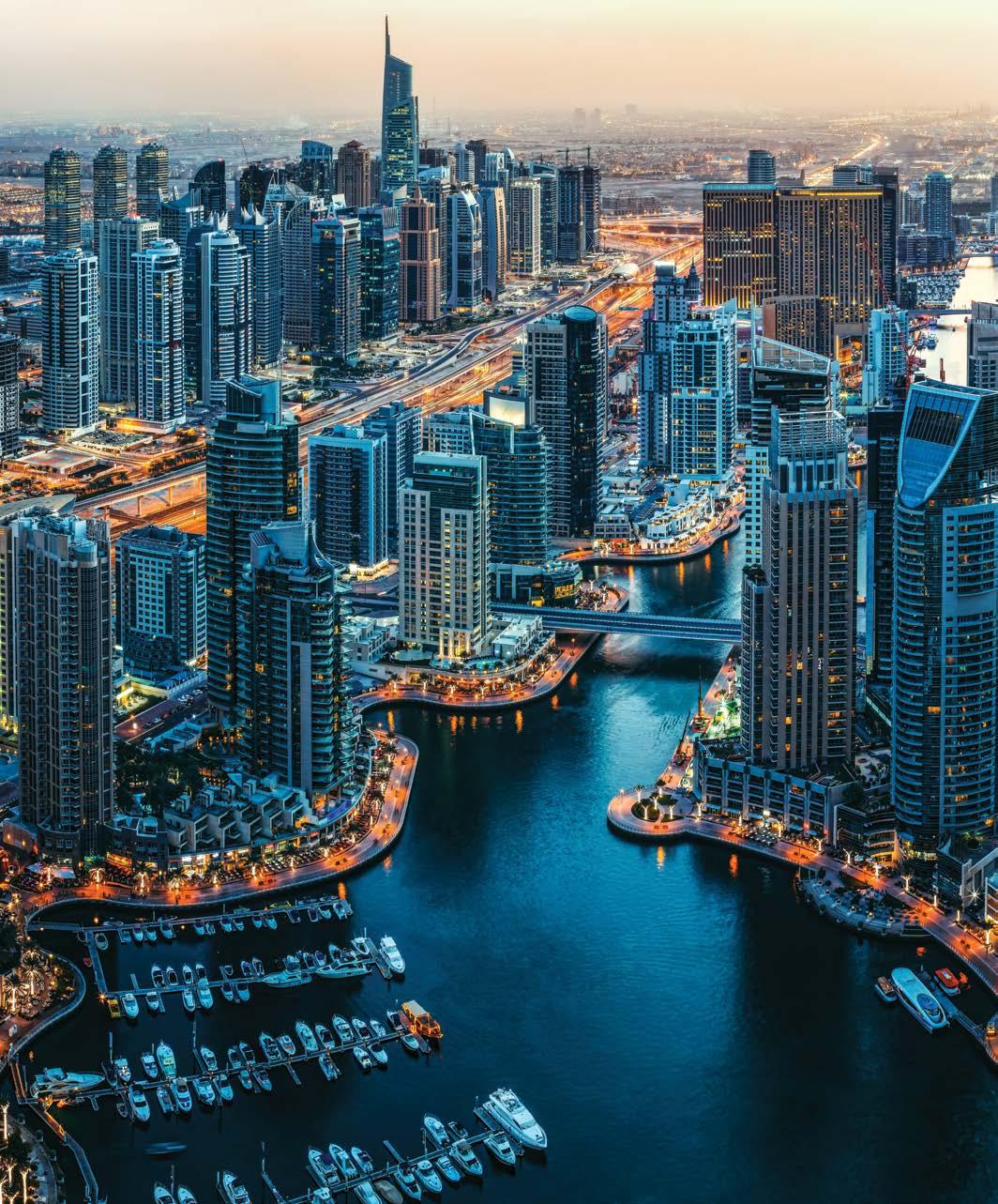

Nestled by the coast of Lusail sits the splendor of Raf es and Fairmont Doha, where luxury is rooted in even the smallest details. Open the doors to mesmerizing hospitality and make memories in a world of sophistication.



Step into a world of opulence when you book a Suite at Raffles Doha.
Experience the added luxury of QAR 750 credit to spend on dining in the hotel, and QAR 500 towards any Spa treatment.
Children aged 12 and below are welcome to indulge in the enchantment of complimentary dining.
Rates starting from QAR 3,500 per night
For reservations, please call +974 4030 7100 or email reservations.doha@raffles.com
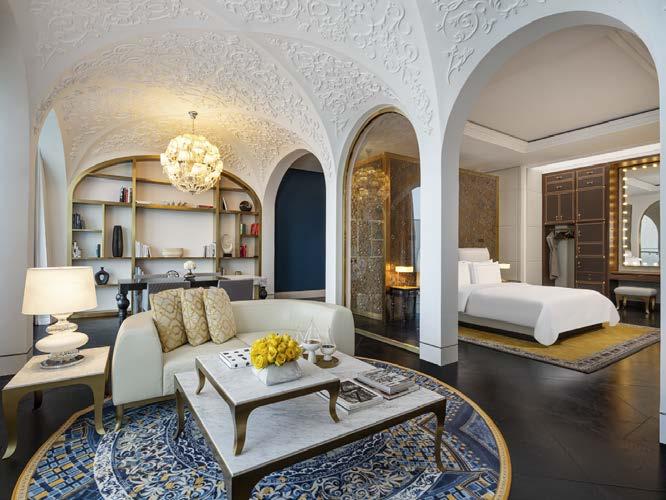
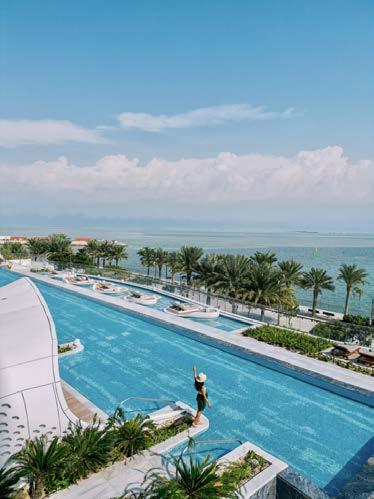





P.15 Golden Boy, Golden Vision
OSCAR DE LA HOYA teams up with Riyadh Season for boxing’s golden era.
P.26 Building Momentum
Checking progress one year after the UN COP28 in Dubai.
P.39 Fail Forward
ALDHABI ALMHEIRI explains how to turn setbacks into success.
P.42 Built on Trust
IMI CEO RANI R. RAAD on building a forward-thinking global media powerhouse.
↑ LEAN TECHNOLOGIES’ co-founders (left to right): Ashu Gupta, Hisham Al-Falih, Aditya Sarkar, and Mehdi Tazi
P.45 Scent of Success
DR. SCENT founder and CEO Hasan Azrak about his success in the field of perfumes.
P.53 Power in partnership
EFRESHLI co-founders Heba Elgabaly and Dina Elhaddad.
P. 58 Empowering Women
SAADIA KHAN, founder, Indus Threads.
P. 60 Startup finance
LEAN TECHNOLOGIES, PEMO, and EPIK FOODS.
CEO Wissam Younane wissam@bncpublishing.net
MANAGING DIRECTOR Rabih Najm rabih@bncpublishing.net
ART DIRECTOR Simona El Khoury
MANAGING EDITOR Tamara Pupic tamara@bncpublishing.net
FEATURES EDITOR Aalia Mehreen Ahmed aalia@bncpublishing.net
REGIONAL DIRECTOR Mahdi Hashemi mahdi@bncpublishing.net
DIRECTOR OF INNOVATION
Sarah Saddouk sarah@bncpublishing.net
GROUP SALES DIRECTOR – B2B GROUP Joaquim D’Costa jo@bncpublishing.net
HEAD OF PARTNERSHIPS
Samir Glor Samir@bncpublishing.net
COMMERCIAL LEAD
Anna Chipala anna@bncpublishing.net
COLUMNIST Tamara Clarke
CONTRIBUTING WRITERS
Fida Chaaban, AlDhabi AlMheiri, Tamara Clarke, and Cormac O’ Donnell.
SUBSCRIBE
Contact subscriptions@bncpublishing.net to receive Entrepreneur Middle East every issue
COMMERCIAL ENQUIRIES sales@bncpublishing.net
ENTREPRENEUR.COM Access fresh content daily on our website
PO BOX 502511 DUBAI, UAE P +971 4 4200 506
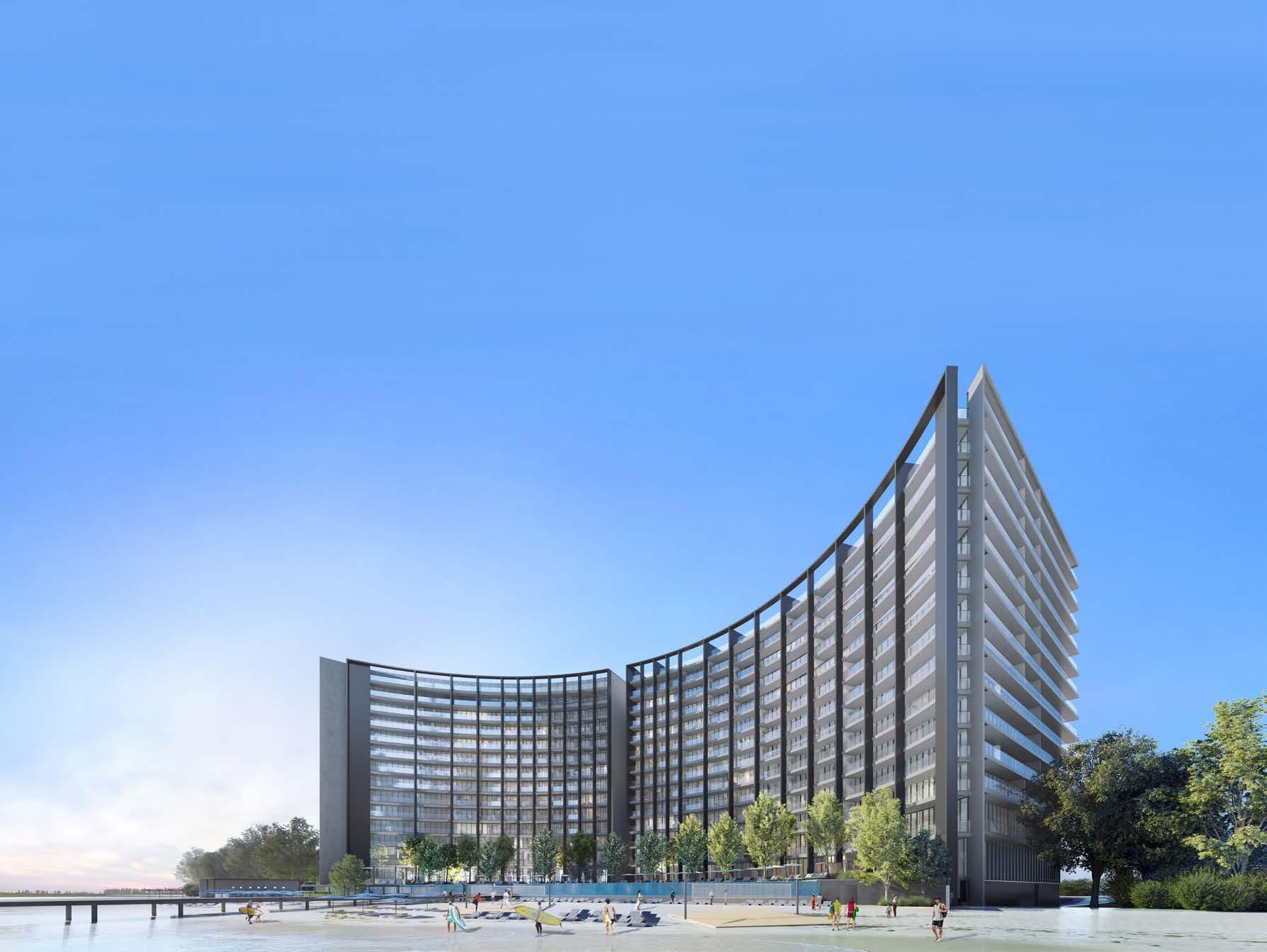
Bringing luxury seaside living to Sharjah for the first time, owners at the Anantara Sharjah Residences enjoy access to the Anantara Sharjah Resort’s world-class amenities, including an infinity pool, five distinctive restaurants, an Anantara Spa and a state-of-the-art gym.
As an investment, owners can enjoy the benefits of a rental management scheme operated by Anantara Hotels, Resorts & Spas, allowing them to maximize their returns when they are not resident in the property.
To register your interest, visit arada.com
LIFE IS A JOURNEY.
From humble beginnings to remarkable heights
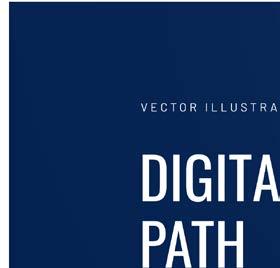





In this issue, we celebrate business stories that often begin with nothing more than a vision and relentless determination. That is how Dubaibased entrepreneur Michael Lahyani built the UAE-headquartered proptech Property Finder, proving that starting from scratch is an opportunity to create something extraordinary, one brick at a time.
Property Finder began quietly in 2005 as a UAE-based property print magazine called Al Bab World. By 2007, 51% of its online portal -AlBabWorld.com- was bought by the online real estate advertising network REA Group, and it was rebranded as Property Finder. Three years later, despite the far-reaching consequences of the 2008-2009 financial recession at the time, Lahyani bought back REA Group’s stake in the company. Since then, the growth trajectory of Property Finder has been on an upward curve, with Property Finder today serving more than 5.5 million active users each month across the UAE, Qatar, Bahrain, Egypt, Saudi
Arabia, and Turkey. Earlier this year, Entrepreneur Middle East interviewed Lahyani after he raised US$90 million in debt financing to buy back Property Finder shares from UAE-based venture capital fund BECO Capital, once again demonstrating his belief in his own company.
In our cover story this month, Lahyani, and Ari Kesisoglu, President, Property Finder, tell us about their next goal- to transform Property Finder from an online proptech platform to a world class tech company in the MENA region (P.20).
And the MENA region is rich with trailblazing entrepreneurs of this sort. In Egypt, Heba Elgabaly and Dina Elhaddad have combined their complimentary skills - Elgabaly’s industry knowledge and connections and Elhaddad’s tech prowess - to make high-quality interior design accessible for consumers across the MENA region with their startup Efreshli (P.53). Dr. Scent founder and CEO Hasan Azrak built his success in the field of perfumes and ambiance fragrances out of the UAE (P.45) while Saadia Khan founded Indus Threads to help women feel empowered on a daily basis (P.56).
One year since the momentous COP28 was hosted in the UAE, our Features Editor Aalia Ahmed talked with L’Oréal Middle East, Chalhoub Group, Accenture Middle East, Radisson Hotels Group, Fuelre4m, Eat-2-Grow Food, and Replate to dissect the event’s ripple effects in the UAE’s private sector today (P.28).
Last but not least, I am glad to support Rani R. Raad, CEO of IMI, and President and Operating Partner of Redbird IMI, on his path of building a forward a forward-thinking global media powerhouse out of Abu Dhabi. “The region has one of the most crowded news media landscapes in the world. To cut through the clutter and the noise, it is essential that our content is relevant, relatable, authentic, and credible,” Raad said in an interview that you can read on pages 42-44. I couldn’t agree more.
Here’s to all the builders—this one’s for you.
WIssam Younane CEO, BNC Publishing







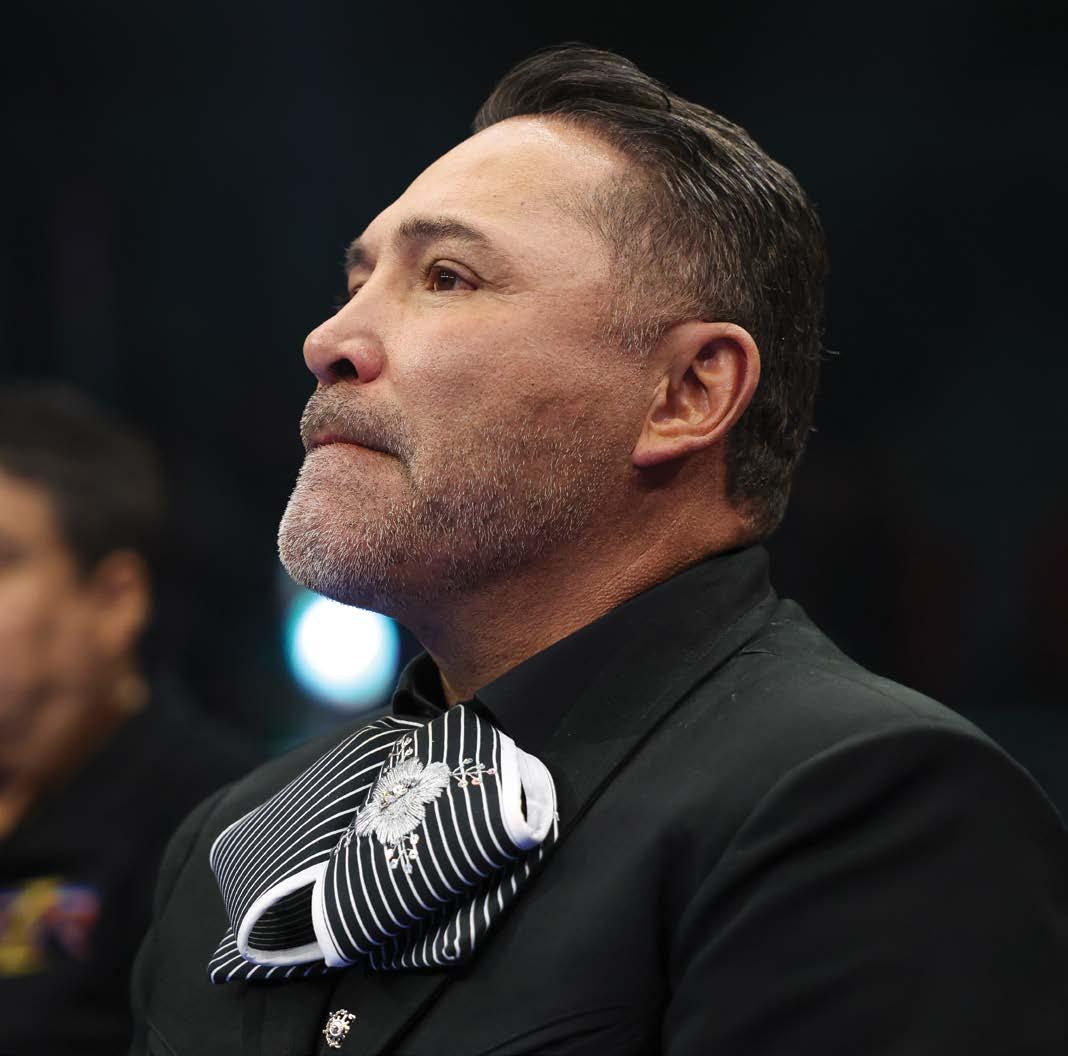
by CORMAC O’ DONNELL
Oscar De La Hoya has long been a prominent figure in the boxing world and is a global superstar in and out of the ring. As an Olympic Gold Medalist, 10-time World Champion in six divisions and one of the biggest draws in the history of the sport; De La Hoya is the personification of success. As an entrepreneur, he has also excelled in making immense profits from a range of diverse interests; magazine publishing, music, and soccer team investment.
His latest venture, “Latino Night” brings his promotional powerhouse, Golden Boy Promotions, to Saudi Arabia as part of Riyadh Season, a series of entertainment, cultural, and sporting events held in the Saudi Arabian capital, offering audiences around the globe a taste of Latino boxing culture. De La Hoya recently sat down with Entrepreneur Middle East to share his insights on this exciting partnership, his
I STRONGLY FEEL NOW THAT WE’VE MADE THE RIGHT CONNECTIONS AND THE RELATIONSHIPS HERE IN RIYADH AND THE MIDDLE EAST, AND, YOU KNOW, I THINK THE SKY’S THE LIMIT.”
passion for the sport, and making strategic business moves in the Middle East.
“We sat down with His Excellency [Chairman of the Saudi Arabia’s General Entertainment Authority (GEA) His Excellency Turki Alalshikh], and we were throwing ideas out there. We were in Beverly Hills, in Los Angeles just brainstorming and seeing what we can do for the people of Riyadh, for Riyadh Season,” De La Hoya recalled. “And you know, we came along with this idea of bringing the flavor of Latino to


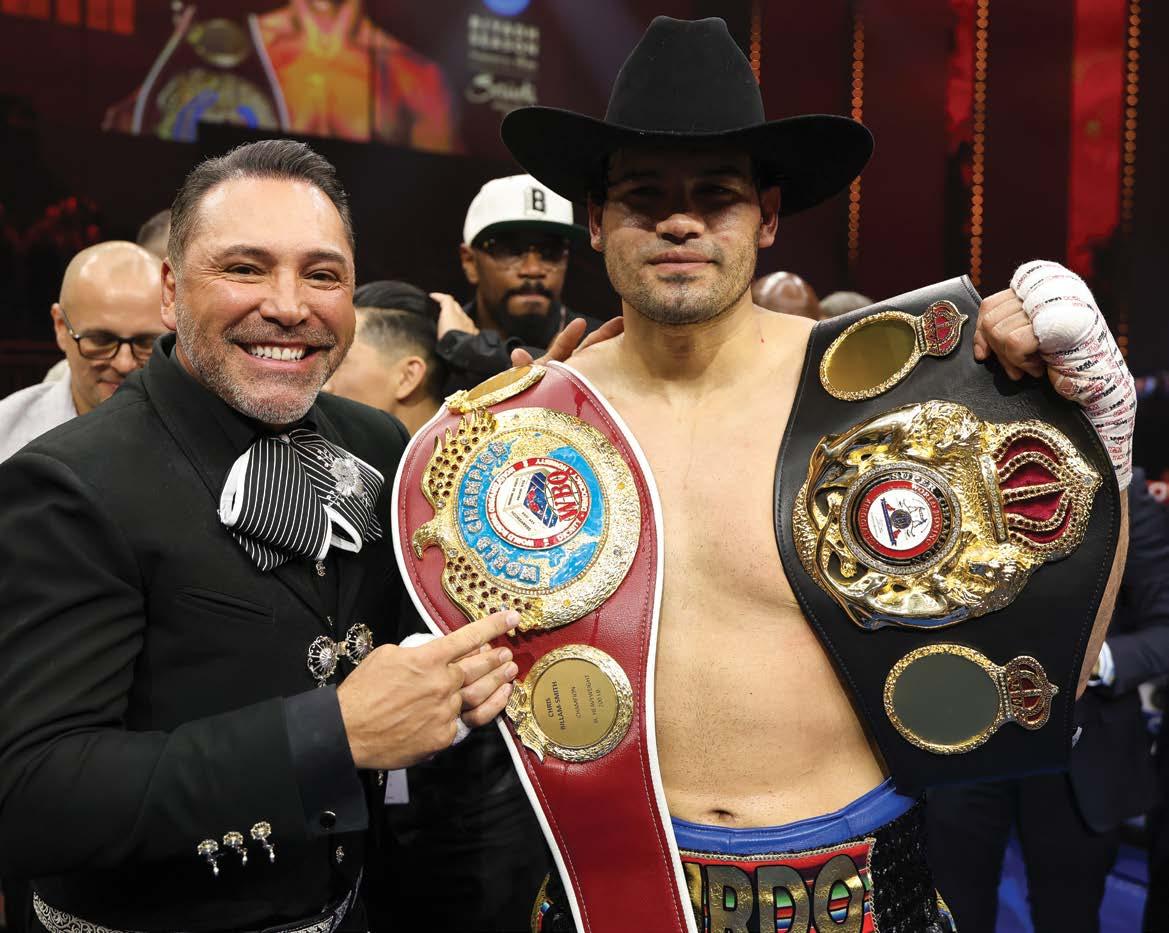
EVERYTHING HAS ALWAYS BEEN ABOUT DOING THE RIGHT THING FOR THE FIGHTER. AND THAT’S WHAT I’M ALL ABOUT—IT’S FOR THE FIGHTERS. SO, THE RESPECT AND THE TRUST I HAVE FROM THE FIGHTERS MAKE MY JOB THAT MUCH EASIER.”
Riyadh and bringing the best Hispanic Latino fighters to Riyadh. We put this card together that is an excellent, excellent card. Every single fight on this card can be a main event in itself.”
For De La Hoya, this is more than just a fight card.
It’s about sharing a cultural experience. “In Riyadh, people will be able to witness the best Latino fighters, will be able to witness live mariachi music and Folklorico dancers. So, it’s going to be a lot of fun.” He emphasized that the collaboration aims
to offer something unique to local audiences while showcasing the vibrancy of Latino culture.
But the event is not just about entertaining those in attendance—it’s about reaching a worldwide audience and tapping into
new demographics. With the event streaming for free on sports streaming platform DAZN, De La Hoya sees it as a strategic opportunity to bring the sport to new eyes and make it accessible to all, especially the Latino community that may not be familiar with the culture of Saudi Arabia.
“The events that we’re putting together live on DAZN; even if you’re not a subscriber to DAZN; you can watch Latino Nights
for free. It’s a gift to the world; It’s a gift from Riyadh Season, and it’s a gift from His Excellency,” he stated. “In Mexico, you can watch for free. In South America, in Puerto Rico, in the United States, in the UK - all live. It’s going to be amazing. It’s going to be historical.”
The enthusiasm and gratitude in De La Hoya’s words were clear when speaking of His Excellency Turki Alalshikh, who has been instrumental in making this event a reality.
“Thanks to His Excellency, Riyadh Season is really putting everything behind boxing and making sure that boxing is alive and well, making sure that the fight fans get to watch the best fights,” De La Hoya noted. “Most importantly, the gift that His Excellency is giving to the whole world—it’s for free. It’s incredible because this is a pay-per-view type card. I could have easily made this pay-per-view, but Turki Alalshikh said, ‘No, let’s make it free for the world.’”
When asked about the longevity of Golden Boy Promotions, De La Hoya pointed to his own experiences as a fighter as a critical factor. “I was a fighter myself, which is obviously a big plus and a huge advantage because I know styles of fighters. I know the psyche of a fighter inside the ring and outside the ring. I think like a fighter when I put fights together, and fighters trust me because I’ve been in the ring,” he explained. “These fighters look up to me. These fighters want to be part of the Golden Boy family. First thing for us—we make sure that we have the best talent.”
Golden Boy Promotions has been around for over 20 years, and De La Hoya attributes their continued relevance to their dedication to fighters. “Everything has always been about doing the right thing for the fighter. And that’s what I’m all about—it’s for the fighters. So, the respect and the trust I have from the
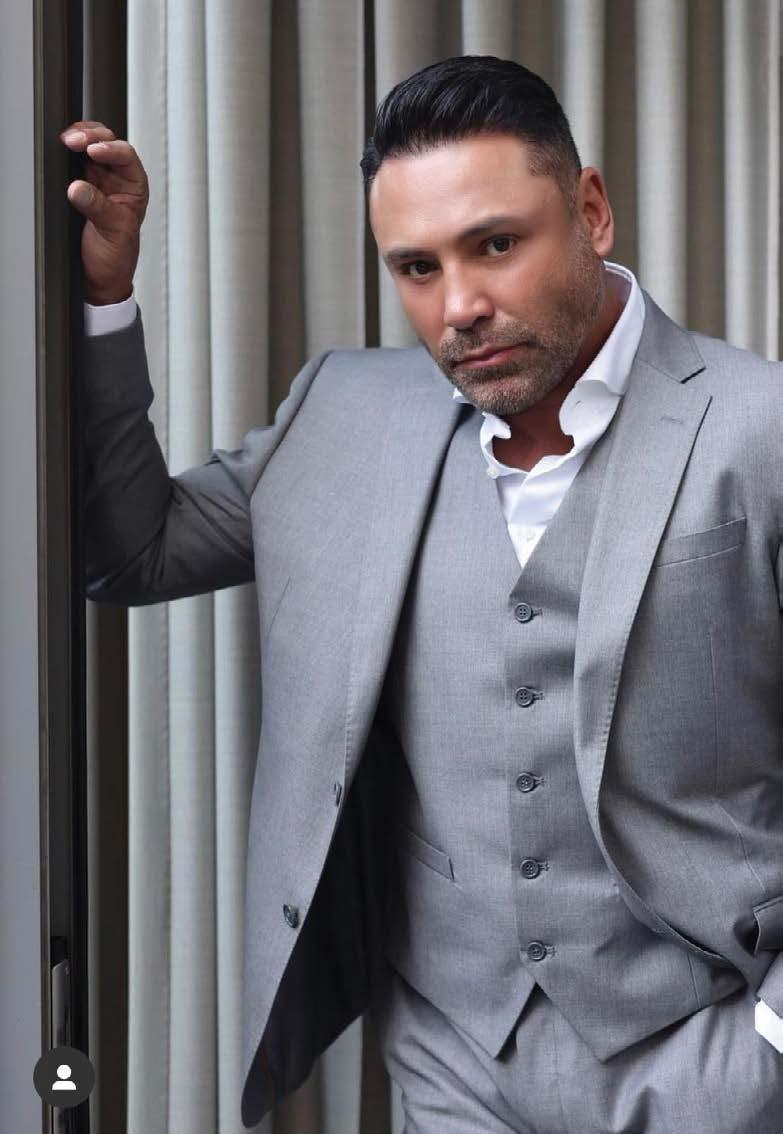
fighters make my job that much easier,” he added. “Being relevant for so many years in the promotional business is accredited to my team, to the vision we have, and obviously the passion for the sport.”
De La Hoya’s ability to adapt to the rapidly changing sports and media landscape is a testament to his business acumen. He understands the importance of combining innovation with tradition, building on the sport’s

'TREP
} "Boxing has opened up the doors for me, you know, becoming world champion, Olympic gold medalist. Everybody wants to be part of your circle; Everybody wants to be part of the success. I've been able to parlay it over the years, meeting amazing people in the industry.
} But outside of the industry, there's been so many opportunities, whether it's real estate, whether it's owning publications, whether it's owning newspapers that I've done over the years. I got involved with football, owning a Major League Soccer team, the Houston Dynamo, owning buildings in Los Angeles.
} I credit the network I've put together. I've credit the relationships I've made over the years.
} But I think I have to credit my success to just staying true to myself, to staying true to what I believe.I never choose an investment that I don't believe in. I have to have a passion for it.
} I think that if you have a passion for an asset, if you have a passion for some sort of investment, you're going to make it. It puts you in a position where it's easier for you to grow that.
} You're putting the time in. You have the passion for it, you have the patience for it.
} Entrepreneurship is not easy. You have your ups and downs. It's like a roller coaster. And you have to be very patient. You have to believe in the asset that that you're investing in. So, I would say, patience, staying true to yourself and believing in what you invest in."
BEING RELEVANT FOR SO MANY YEARS IN THE PROMOTIONAL BUSINESS IS ACCREDITED TO MY TEAM, TO THE VISION WE HAVE, AND OBVIOUSLY THE PASSION FOR THE SPORT.”
legacy while also finding new ways to engage global audiences.
Just this month, De La Hoya made the significant decision to sell the iconic “The Ring” Magazine [an American boxing magazine first published in 1922 that De La Hoya owned from 2007 to 2024] to His Excellency. “I’ve had many, many offers over the years to sell The Ring Magazine. I’ve had huge offers to sell the publication because of its prestige, because of the magazine being such an iconic staple in the sport. But I just was waiting for the right person, for the right timing, and, my gosh, His Excellency Turki Alalshikh— he’s proving over and over and over again how much passion he has for the sport. He was the perfect person to sell this publication to. It’s in great hands.”
For De La Hoya, selling The Ring Magazine wasn’t just a business decision; it was about ensuring the legacy of a storied publication would be preserved and expanded. His confidence in the future of The Ring under Alalshikh’s stewardship is palpable. “The ideas he has, the vision he has to grow the sport of boxing, to grow the magazine, to bring it back to its limelight, to bring it back to its prestige—I strongly feel that Turki Alalshikh not only wants to make fights, but he wants to grow the sport,” De La Hoya emphasized. “He’s going to bring it back to where it
was. He’s going to make sure that The Ring Magazine stays intact.”
As for future business ventures in the Middle East, De La Hoya explained that the foundation has been laid for potential opportunities. “I strongly feel now that we’ve made the right connections and the relationships here in Riyadh and the Middle East, and, you know, I think the sky’s the limit. As long as we are producing the correct product, as long as we’re giving His Excellency the right fights and the best fights; the best product. His Excellency is all about perfection. His Excellency is all about giving his fans in Riyadh, in the Middle East, in the world, the best product possible.”
Oscar De La Hoya’s excitement about his partnership with Riyadh Season is evident in every word. His passion for boxing, his commitment to the fighters, and his enthusiasm for introducing the sport to new audiences align perfectly with Saudi Arabia’s Vision 2030.
Together, they are not only making history in Riyadh but also strategically opening new markets and ensuring that the sport’s prestige is both preserved and elevated. Moreover, they are contributing to a new chapter in global boxing—one that embraces inclusivity, accessibility, and cultural celebration.
Diving deep into what it takes to succeed in the real estate classifieds business with Property Finder.
by TAMARA PUPIC
} It was in 2007 when Michael Lahyani, founder and CEO of Property Finder, decided to launch the online prop tech platform with the ambition of building a world class tech company in the region.
Since that time, he has raised the bar in the real estate industry, dedicating his time to shaping an inclusive future for real estate where everybody can thrive. This is no mean feat when you consider that 70% of tech startups don’t survive their first three years, and only 30% of companies make it past 20 years.
Lahyani has created a formidable leadership team, gathering talent from across the globe to continue to fuel the success of the business. A key member of that leadership team is Ari Kesisoglu, President of Property Finder, who has taken the time to share with us some key tips for other entrepreneurs, who can learn from Property Finder’s success.
In the world of entrepreneurship, it is often advised to start up ventures in a market that is truly fertile for the business idea. It is one of the most crucial steps to achieving success in any business. Yet, few have done it so well as the UAE-headquartered Property Finder.
To understand why, it is enough to put two pieces of information together. Here Ari Kesisoglu, who leads operations at the company, explains what those two pieces are. First, it is about being purpose-led, he explains. For Property Finder, under the guidance of its founder Michael Lahyani, that purpose is “to change living for good in the MENA region,” which means creating an inclusive environment for people to thrive.
The second one is realizing how many home seekers there are in the UAE and the opportunities that presents. In 2005, when Michael Lahyani launched a UAE-based property print magazine that would grow into Property Finder two years later, the population in the UAE was roughly 4,500,000 million people, and at the time of writing this article, Worldometer’s elaboration of the latest United Nations data states that little over 11,000,000 million people live in the country. “The growth of Property Finder has been driven by real demand, supported


by strong fundamentals,” Kesisoglu says. “The UAE’s population growth combined with increasing urbanization and economic diversification, creates genuine demand for quality housing and communities. This isn’t just about building properties; it’s about creating sustainable, livable communities that meet the evolving needs of our diverse population.”
Property Finder is considered a trusted platform for developers, real estate brokers, and property seekers to make informed decisions on all things real estate. Over the years, its growth trajectory has been on an upward curve, with the property portal today serving more than 5.5 million active users each month across the UAE, Qatar, Bahrain, Egypt, Saudi Arabia, and Turkey. The growth of Property Finder has mirrored the growth of the real estate sector in the UAE and the broader MENA region. “We’re witnessing robust growth across several markets. Egypt’s potential continues to expand, and Saudi Arabia’s ambitious mega projects are reshaping the kingdom’s real estate landscape. These developments are
creating new opportunities and raising the bar across the entire region,” Kesisoglu explains. “If we are talking about the UAE, the government’s forward-thinking policies, including recent expansions of the Golden Visa program and the introduction of new residency options, have significantly enhanced the country’s appeal. These initiatives, combined with the UAE’s impeccable infrastructure, global attractions, and business-friendly environment, continue to draw substantial investment into the real estate sector.”
Kesisoglu notes that the UAE has also made great improvements relating to market transparency in the real estate sector. “Both Dubai and Abu Dhabi were recognized amongst the top five improvers in the 2024 Global Real Estate Transparency Index, for example,” he says. “This improvement in transparency isn’t just about rankings - it’s fundamentally changing how people interact with real estate in our region, creating a more trustworthy and efficient market for all stakeholders.”
Today, Property Finder is guided by a vision to be a

AS ONE OF THE FEW HOMEGROWN TECH COMPANIES FROM THE MIDDLE EAST THAT HAS ACHIEVED SIGNIFICANT SCALE, WE HAVE AN OPPORTUNITY TO DEMONSTRATE HOW TECHNOLOGY CAN TRANSFORM TRADITIONAL INDUSTRIES WHILE NURTURING LOCAL TALENT AND INNOVATION.”
lighthouse technology company in the MENA region region which, Kesisoglu explains, stems from its unique position at the intersection of real estate and technology. “As one of the few homegrown tech companies from the Middle East that has achieved significant scale, we have an opportunity to demonstrate how technology can transform traditional industries while nurturing local talent and innovation,” he says.
In achieving this vision, the company focuses its growth strategy on three key pillars- geographic expansion, product innovation, and ecosystem development. “Geographic expansion doesn’t necessarily mean going into new countries in the near future but bringing our advanced technology in the UAE to the other countries we operate in,” Kesisoglu says. “We’ve already demonstrated this through our strategic partnership with Hepsiemlak in Turkey.
Looking ahead, we see significant opportunities in Saudi Arabia’s rapidly evolving real estate market, aligned with Vision 2030, and in Egypt’s growing property sector.” When it comes to product innovation, Kesisoglu points out that Property Finder has been heavily investing in artificial intelligence (AI) and machine learning capabilities with an aim to enhance its core offerings. ”As a business, we’ve made significant investments in developing technologies that support agents, brokers, and developers, he says. “We do this to improve experiences for both customers and consumers. We prioritize features and
WE’RE NOT JUST IMPROVING INDIVIDUAL ASPECTS OF THE REAL ESTATE INDUSTRY – WE’RE ACTIVELY SHAPING ITS FUTURE WHILE FOSTERING STRONG PARTNERSHIPS ACROSS THE ECOSYSTEM.”
functionalities that are based on comprehensive insights, to ensure our solutions address industry challenges.”
For the sake of an example, Kesisoglu points to a common challenge in property transactions - the potential conflict of interest between buyers and sellers. “Buyers want assurance they are getting a good deal, while sellers need confidence that they are receiving a fair price and not underselling their property,” he explains. “To bridge this gap, Property Finder identified the need for a centralized hub that delivers detailed real estate insights to both parties. This led to the creation of Data Guru, a one-stop platform that provides a 360-degree view of the market. It includes essential features such as a price map, community insights, residential insights, new projects, and a rent versus buy calculator. These tools empower users with data-driven knowledge, helping them make more informed decisions.” Other technological advancements were developed in response to the customer pain points. Having conducted a survey among its customers, Property Finder revealed that 44% of home-seekers in the UAE
regarded ‘trust’ as a primary criterion, with unreliable agents being a key pain point for them. It was clear that the home-seeker’s journey had to be made much easier and more trustworthy.
Property Finder first launched its AI-driven ranking system, SuperAgent, which is a 100% automated process that depends on the individual agent’s performance. Real estate agents who meet the guidelines of excellence and offer high-quality services are awarded the SuperAgent badge. Our
SuperAgent program, currently recognizes over 4,000 agents through AI-driven rankings, and demonstrates how technology can create tangible benefits for both agents and home seekers. By rewarding excellence and connecting consumers with reliable agents, the program promotes transparency, trust, and elevated service standards across the industry. This isn’t just about numbers - we’re seeing tangible improvements in agent responsiveness and service quality. For our consumers SuperAgents raise the bar in terms of service, from
being more responsive, and transparent to elevating the whole experience. When they contact an agent via the Property Finder platform they can expect a much better service.
Kesisoglu adds that Property Finder launched its 2024 campaign - A Home for Every Life - also in response to the needs of its customers. “Our campaign directly addresses a fundamental truth that we’ve uncovered through our platform data and consumer research, and it is that today’s home seekers are increasingly prioritizing lifestyle alignment over traditional property metrics,” he says. The campaign brings to life Property Finder’s role as what we internally call ‘an empathetic problem solver’, showcasing how we
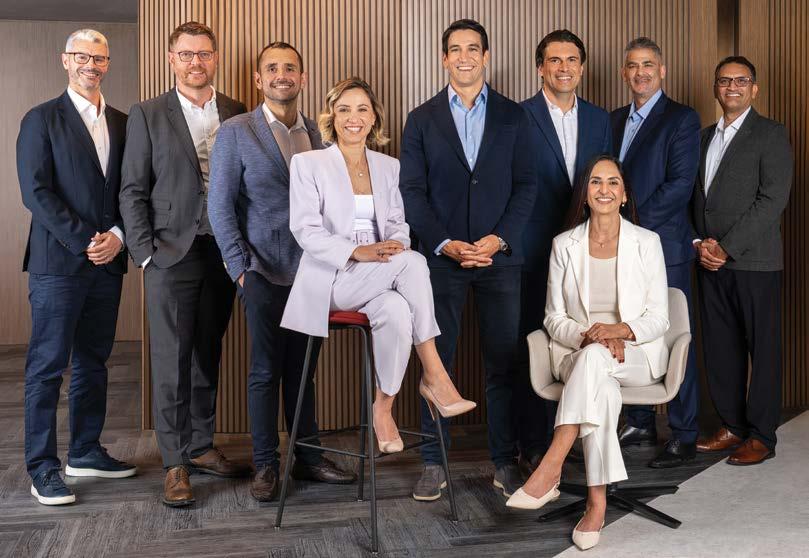
THE FUTURE BELONGS TO PLATFORMS THAT CAN COMBINE TECHNOLOGICAL INNOVATION WITH HUMAN EXPERTISE TO CREATE TRUSTED, FRICTIONLESS HOME-SEEKING JOURNEYS THAT CATER TO DIVERSE LIFESTYLE ASPIRATIONS.”

Dubai is a synonymouscitywith speed, connectivity, and a forwardthinking approach.”
help people find homes that match their unique way of living. It reflects our deeper understanding that home searching isn’t
just about finding a property - it’s about discovering a space that enhances and enables your desired lifestyle. This aligns with our strategic focus on trust and transparency, as we leverage our comprehensive data and insights to help each home seeker make informed decisions that support their individual lifestyle aspirations.”
When it comes to elevating the real estate industry and developing the whole ecosystem around it, Property Finder believes that it requires both technological innovation and meaningful industry partnerships. This vision comes to life
through several key initiatives driving positive change across the ecosystem, such as the Property Finder Academy which provides educational content to over 2,000 active professionals currently using it. Other initiatives are Property Finder Connect event, which has evolved from a networking event for industry professionals into a thought leadership series, and SheForShe Empowered by Property Finder initiative which is a six-month, fully-funded program that pairs selected mentees with top female real estate professionals in the region. It champions gender equality and empowers women in the
} Solve real problems. "Don’t just innovate for innovation’s sake. Some of the most successful tech initiatives are rooted in addressing clear, real-world challenges. By focusing on solving genuine problems, businesses can ensure their innovations are meaningful and impactful. For example, Property Finder’s SuperAgent program was designed to tackle the critical issue of trust in the real estate market.”
} Always adapt to your consumer’s high expectations “Dubai is a city synonymous with speed, connectivity, and a forwardthinking approach. Global benchmarks may not always align with the demands of this unique market. Understanding and adapting to the local consumer’s high expectations is vital for staying competitive and relevant in such a dynamic environment.”
} Combine talent and technology for success “It’s a winning formula. Cutting-edge technology alone is not enough - its success depends on the people managing and implementing it. Attracting and retaining top global talent is essential for effectively leveraging technological innovation. Businesses must strike the right balance between using advanced tools and working with skilled professionals to drive sustainable growth.”
UAE real estate market. Also, the annual Property Finder Awards ceremony, which was established in 2013, has been continuously offering an inclusive platform for industry leaders to highlight the great progress made in the previous year. “To add to all of that, I would say that our strong relationships with regulatory bodies also set us apart in the market,” Kesisoglu says. “Our collaborations with the Dubai Land Department (DLD) and the Abu Dhabi Real Estate Centre (ADREC) demonstrate our commitment to improving data accessibility and market transparency.
Last but not least, Kesisoglu says that the company’s goal of becoming a lighthouse company in the region would not be possible without its talented teams. “We’ve continued to attract and retain top talent at every level, growing to over 600 employees across the MENA region,” he says. “We have multiple open roles and also have a big focus on growing our own people internally. At the end of the day “to change living for good in the region” will require some of the brightest minds of the world working together.”
Looking ahead, Kesisoglu expects three transformative consumer trends to significantly shape the future of property portals. “First, there’s a clear shift toward personalizationhome seekers expect platforms to understand their unique preferences and lifestyle needs, not just basic criteria like price and location,” he says. “Second, convenience has become non-negotiable- users want seamless experiences that simplify the complexity of
property search, from initial browsing to final transaction. Third, there’s growing demand for transparency and trust through enhanced data accessibility.”
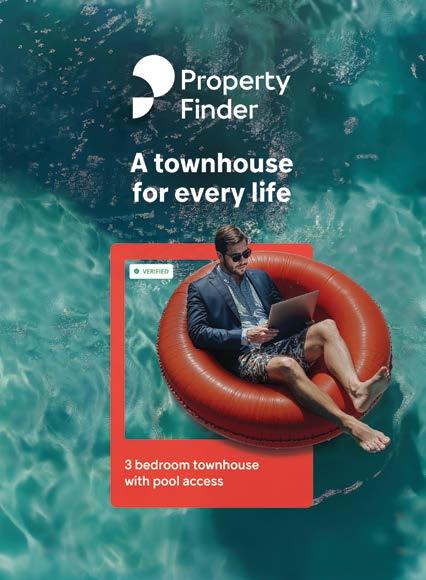

We’ve continued to attract and retain top talent at every level, growing to over 600 employees across the MENA region.” “
In the end, Kesisoglu reveals that today’s home seekers are increasingly approaching property search as a lifestyle decision rather than just a transaction. “They want comprehensive insights about communities, amenities, and living experiences, all presented in an easily digestible format,” he says. “This is particularly evident in the UAE market, where community living and lifestyle considerations drive many housing decisions.” To address these evolving needs, Kesisoglu concludes, property portals must leverage AI and machine learning to deliver personalized recommendations while providing verified, real-time market data. “The future belongs to platforms that can combine technological innovation with human expertise to create trusted, frictionless home-seeking journeys that cater to diverse lifestyle aspirations,” he says.

One year since the momentous COP28 was hosted in the UAE, four major corporations and three startups dissect the event’s ripple effects in the country’s private sector today. by
AALIA MEHREEN
As we enter the final month of 2024 -the UAE’s “Year of Sustainability”- we are also upon the first anniversary of the 28th edition of the Conference of the Parties of the United Nations Framework Convention on Climate Change (COP28) which was hosted in Dubai from November 30-December 13, 2023. The many decisions and policies that came to light at the historic event were all discussed and dissected at length at the time- but an event’s success can perhaps only be fully gauged by what follows it. And while the UAE govern-
ment has relentlessly amplified its many sustainability initiatives since the COP28, the onus of matching up to the goals they’ve set has been upon the nation’s private sector. One entity that certainly felt its sustainability initiatives being boosted in the months following the conference has been L’Oréal Middle East, the regional branch of the renowned global luxury cosmetic brand. “At L’Oréal, we have long prioritized sustainability as a cornerstone of our business strategy, even before COP28 brought the issue to the forefront of global discourse,” says Laurent Duffier, the Managing Director. “Our L’Oréal for the Future program, launched in 2020, established a framework for
sustainable impact with goals aimed at achieving carbon neutrality, implementing 100% renewable energy across all our sites by 2025, and transitioning to fully recycled or bio-based packaging by 2030. The L’Oréal for the Future Summit further amplified these goals, fostering a collaborative environment for advancing our sustainability roadmap, encouraging a shared commitment across our ecosystem. And while the summit offered the right platform to discuss and implement innovative solutions tailored to our vision, COP28 reinforced the importance of these ongoing commitments. This collective momentum underscores our belief that sustainability must be a shared ambition.”
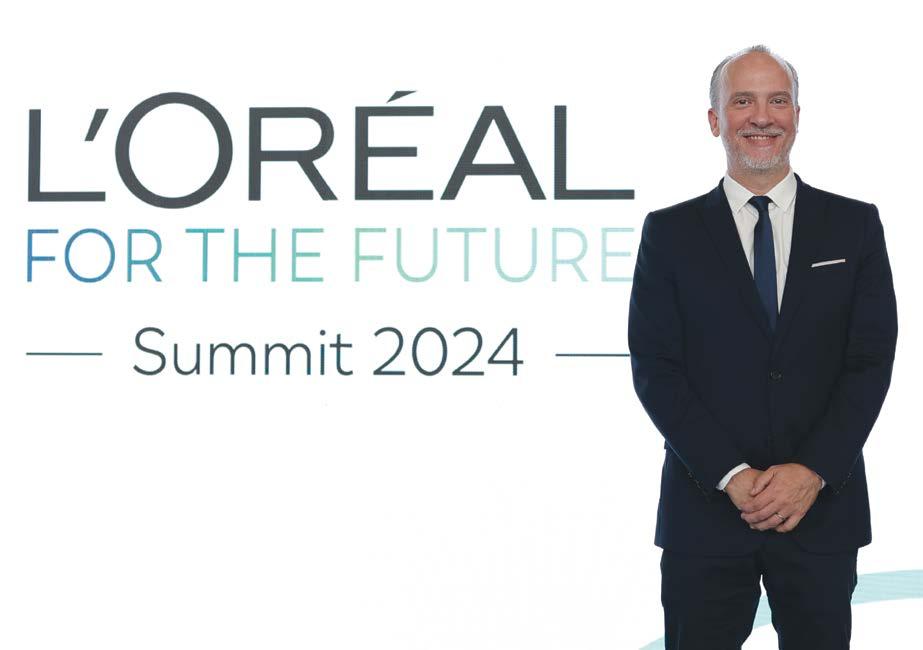
Laurent Duffier, Managing Director of L’Oréal Middle East, on what UAE-based companies must keep in mind while formulating their ESG policies
} EMISSION REDUCTION IS PARAMOUNT “Aligning with national sustainability goals shows environmental responsibility and resonates with stakeholders. Companies should implement carbon tracking tools, setting specific reduction targets to reinforce accountability.”
}WATER CONSERVATION IS EQUALLY VITAL “This is especially given the region’s limited resources. Integrating efficient water management systems and setting clear conservation targets can help companies make quantifiable progress, preserving a critical resource.”
}STAKEHOLDER COLLABORATION IS ESSENTIAL “Building partnerships across the value chain creates a shared commitment to sustainability, amplifying efforts and fostering innovation. Collaborations with suppliers, customers, and industry peers help drive ESG initiatives at scale, leading to a more impactful and cohesive approach.”
}TRANSPARENT MEASUREMENT AND REPORTING FORTIFY CREDIBILITY
“Regular third-party audits and adherence to frameworks like the Greenhouse Gas Protocol and the UAE’s Green Agenda 2030 provide consistent benchmarks. Transparent communication of progress not only reinforces trust but also motivates continuous improvement.”
Indeed, a big part of L’Oréal Middle East’s post-COP28 sustainability endeavors have been championed through partnering with like-minded organizations. “In the past year, we achieved a 50% reduction in carbon dioxide (CO2) emissions, and the introduction of our Gjosa showerhead technology has cut water use in salons by 65%, showcasing our commitment to responsible resource management,” Duffier shares. “And collaboration has been critical to our progress! Partnering with Sephora [the French retailer of personal care and beauty products based in the UAE] we’ve prioritized sustainable retail practices, using eco-friendly materials and promoting awareness. With Aramex [a UAE-based logistics, courier and package delivery company], we’ve
implemented sustainable transportation solutions, while Mohebi [a UAE-based vertically-integrated supply chain management company] has supported us in creating a more sustainable supply chain. These partnerships underscore our focus on impactful, measurable change in line with the United Nations Sustainable Development Goals (UNSDGs) and the UAE’s 2030 Green Agenda. Quantifying sustainability progress can be challenging, especially when balancing global and regional standards, yet these collaborations have helped us drive measurable impact toward our goals, ensuring that every initiative aligns with both local sustainability objectives and the broader SDGs.”
Duffier’s emphasis on collective responsibility,
however, hasn’t been unique to L’Oréal Middle East. When asked how the COP28 has helped them with their respective environmental, social and governance (ESG) ambitions, very similar sentiments are shared by the leading sustainability executives at Accenture Middle East, a leading global professional services company; and Chalhoub Group, a UAE-grown luxury goods retailer and distributor. “COP28 was a pivotal moment for Chalhoub Group, empowering us to deepen our commitment to sustainability and accelerate key environmental initiatives,” says Florence Bulte, Chief Sustainability Officer at Chalhoub Group. “The conference offered an invaluable platform to build meaningful collaborations with industry leaders, uniting expertise and
resources in support of our Net Zero goals. This led to strengthened partnerships and the launch of large-scale engagement programs across our value chain, driving impactful change. As we reflect on this collaboration, leaving differences aside and partnering for common goals allowed us to channel financial, technical, and intellectual resources effectively, amplifying our positive impact on the environment.”
On the other hand, Accenture Middle East’s Sustainability
Lead Sylvia Rigato notes that while collaborations in sustainability often consider the opening of new doors, they can very well lead to the strengthening of old ones as well-as has been the case with her company’s participation at the annual Abu Dhabi International Petroleum Exhibition and Conference (ADIPEC). “Building on the momentum of COP28, the latest edition of ADIPEC emphasized decarbonization and the energy transition more than in previous installments,” Rigato shares. “Accenture Middle East’s participa-
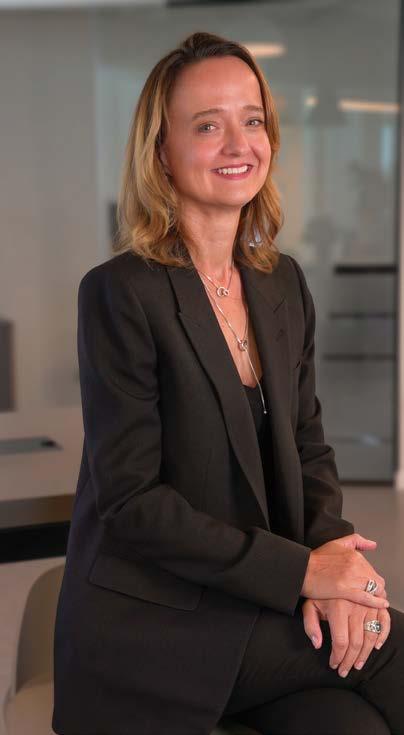
→ FLORENCE BULTE is the Chief Sustainability Officer at Chalhoub Group, a UAE-grown luxury goods retailer and distributor.
THE ACCURATE QUANTIFICATION AND ANALYSIS OF SUSTAINABILITY DATA REMAINS A MAJOR CHALLENGE… FOR ANY COMPANIES TO MAKE A TANGIBLE IMPACT, THEY MUST ADOPT A DATA-DRIVEN APPROACH TO SUSTAINABILITY.”
tion in ADIPEC has always been linked to our sustainability focus as a company and to the broader sustainability initiatives in the UAE. We led discussions on leveraging technology for sustainability, including sessions on digital transformation and artificial intelligence (AI) in the energy sector. Accenture recently collaborated with Emirates Nature-WWF [a non-profit organization dedicated towards the UAE’s environmental conservation] to advance the Sustainable Blue Economy Principles in the UAE. Fo-
cusing on integrating ecological conservation with economic development, this initiative emphasizes the importance of ocean health and sustainable finance. Finally, we also partnered with key stakeholders to advance sustainable energy projects as part of their broader strategy to foster collaboration and drive systemic change in the energy sector.”
Now, when it comes to energy-intensive industries, hospitality certainly appears at the top of the list. In fact, a report
Florence Bulte, Chief Sustainability Officer at Chalhoub Group shares four key factors to formulate effective ESG goals in the UAE
} MATERIALITY “This is to identify and focus on the ESG issues that are most relevant and impactful to a company’s specific operations, stakeholders, and long-term value. It supports the prioritization of relevant Issues, it enhances stakeholder trust. It allows risk management and opportunity identification, and it aligns with reporting standards.”
} DATA-DRIVEN TRANSPARENCY
“Setting clear, measurable targets and establishing transparent reporting mechanisms are essential for accountability. Data-backed insights will help track progress and drive continuous improvement.”
} EMPLOYEE EMPOWERMENT AND CULTURE “Fostering a sustainabilitydriven culture internally is crucial. Engaging employees through training, incentives, and involvement in ESG initiatives can drive a deeper, organization-wide commitment to sustainability.”
} CROSS-INDUSTRY COLLABORATION
“Sustainable development requires collaboration across industries. By partnering with other businesses, NGOs, and governmental bodies, companies can share best practices, pool resources, and collectively address systemic challenges in achieving large-scale impact.”
by EHL Insights, a global platform offering insights and studies on hospitality and service sectors, notes that “the most imminent threat that the hospitality industry is having to deal with is the rising cost of energy.”
For Inge Huijbrechts, Chief Sustainability and Security Officer at Radisson Hotels Group, one of the world’s largest hotel groups with a staunch presence in the Middle East, the urgency of this matter has always been at the forefront of her decisions. Which is why the Group’s 2023 Responsible Business Report,
→ SYLVIA RIGATO is the Sustainability Lead at Accenture Middle East, a leading global professional services company that operates in the UAE.

THE ROADMAP LAUNCHED BY THE COP TROIKA GIVES BUSINESSES SOME DEGREE OF CERTAINTY ON THE LIKELY DIRECTION OF COP AND ALLOWS CORPORATE LEADERS TO DESIGN NEW STRATEGIES THAT ALIGN TO GLOBAL OBJECTIVES. A GOOD PLACE FOR COMPANIES TO START IS TO UNDERSTAND THE IMPLICATIONS OF THE ENERGY TRANSITION ON THEIR BUSINESS MODELS AND ENSURE AMPLE INVESTMENT ON DEVELOPING THEIR WORKFORCE TO SUPPORT THESE SIGNIFICANT CHANGES.
marking milestones that were achieved even before the COP28 commenced, showed that it had achieved 35% reduction in carbon footprint per square meter since 2019, had 79 hotels on 100% renewable electricity while 53 of its hotels are green building certified, and 29,500 people were provided safe drinking water for life through the Group’s towel re-use and green housekeeping programs. By 2030, the entity aims to reduce greenhouse gas (GHG) emissions by 46% and progress towards Net Zero by 2050.
Sylvia Rigato, Sustainability Lead at Accenture Middle East, on how to initiate successful collaborative efforts in sustainability
} ENSURE THAT ALL PARTNERS HAVE A SHARED VISION AND COMMITMENT “This can help in setting clear common goals so that everyone works to the same objectives. Companies would also do well to collaborate with partners who have the same values and ethical standards. This will help build trust and ensure that all actions taken are in line with overarching sustainability principles.”
} PARTNERS MUST BRING COMPLEMENTARY STRENGTHS TO THE TABLE “Diversity of opinions can lead to more innovative solutions and a more comprehensive approach
Hto sustainability solutions. Pooling resources – financial, technological, or human can only maximize impact.”
} MAINTAIN OPEN AND TRANSPARENT COMMUNICATION WITH ALL PARTNERS “This is crucial to the success of any partnerships. With sustainability, this will mean establishing clear accountability mechanisms to ensure that all partners are meeting their commitments –this could include setting measurable targets, monitoring progress, and being transparent about successes and challenges.”
uijbrechts then highlights how the COP28 set off in motion a series of new sustainabilitydriven initiatives for the Group. “During the COP28 climate conference, Radisson Hotels Group launched its “Net Zero Nights” campaign which ensured that every guest night during COP28 across its entire UAE portfolio of 16 hotels, became net zero,” she shares. “Sustainability thus became the default option for guests and Radisson Hotels Group led this positive change by purchasing renewable energy certificates [which certify that one megawatt-hour (MWh) of electricity was generated from a renewable source and fed into the grid] for 3,525 MWh, and certified carbon credits [the reduction or removal of one metric ton of carbon dioxide equivalent (CO2e) emissions] offsetting 1,500 CO2e through the REDD+ project, a global initiative under the United Nations Framework Convention on Climate Change (UNFCCC) aimed at reducing emissions from deforestation and forest degradation, in the Rimba Raya reserve in Borneo. This carbon offsetting project not only aligns with the Group’s environmental objectives but also advances UNSDGs.”
Having been at the helm of these endeavors, Huijbrechts has a few nuggets of wisdom to offer peers and beginners in the UAE’s hospitality industry. “My advice for organizations within the UAE hospitality sector would be the need to
“
My advice for organizations within the UAE hospitality sector would be the need to accelerate and achieve scale. When it comes to the implementation of policies that allow hotels to accelerate the net zero transition- for example, in renewable energy, currently the problem is volume that most of the hotels represent.”
accelerate and achieve scale,” she says. “When it comes to the implementation of policies that allow hotels to accelerate the net zero transition- for example, in renewable energy, currently the problem is volume that most of the hotels represent.
At Radisson Hotels Group, we are looking beyond the boundaries of our own company and convening the industry in leading and world-wide recognized initiatives such as the World Sustainable Hospitality Alliance’s Pathway to Net Zero Hospitality and the World Travel and Tourism Council’s Hotel Sustainability Basicsaligning with such widely acknowledged certifications and programs provides companies with a credible framework for approaching sustainability. This alignment not only assures compliance with industry standards but also enhances credibility, demonstrating a company’s genuine commitment to sustainable practices.”
To foster such commitment, a good COP28-driven starting point has been the UAE Consensus, a
framework for all countries to keep the average global temperature rise below 1.5 degree Celsius (°C).
Indeed, when COP28 President Dr. Sultan Al Jaber spoke about this historic set of measures last year, he noted that “if this agreement is to get traction, we need serious action.” The UAE Consensus also mandated what is known as the COP Presidencies Troika- a collaborative effort between the presidencies of COP28 as well as COP29 (Azerbaijan) and COP30 (Brazil). Accenture’s Rigato states that such an effort will certainly help UAE-based companies to map out their sustainability journeys. “The UAE Consensus provides a blueprint for companies in the UAE to step up their alignment to
→ Inge Huijbrechts is the Chief Sustainability and Security Officer at Radisson Hotels Group, one of the world’s largest hotel groups with a number of branches in the UAE.
Inge Huijbrechts, Chief Sustainability and Security Officer at Radisson Hotels Group, on how hospitality startups and businesses in the UAE can set efficient sustainability targets
national climate priorities and show intent in shaping credible energy transition plans,” Rigato adds. “If sectoral transition plans are executed correctly, the Middle East’s youthful economies will be able to experience significant growth, new opportunities and job creation. As a key player in the oil and gas industry, the UAE sits at the heart of the Middle East’s old global energy system. As such, the roadmap launched by the Troika, which underlines international cooperation, gives businesses some degree of certainty on the likely direction of COP and allows corporate leaders to design new strategies that align to global objectives. A good place for companies to start is to understand

} ACCELERATION AND STRATEGIC SCALING TOWARD NET ZERO BY 2050
“The key is to maintain momentum and grow sustainably with industrywide aligned ambitions. It is essential to keep pushing forward with ambitious Net Zero targets rather than slowing down, but we need to approach this in a way that ensures resilience and sustainability.”
} LEVERAGING THE SUPPORT OF THE WORLD SUSTAINABLE HOSPITALITY
ALLIANCE (WSHA) “The WSHA is an important player in helping the UAE
achieve this balance. With our plans to establish a dedicated Middle East chapter based in Dubai, we aim to unite the industry and create a platform for collective action. This chapter will not only promote shared sustainability standards but also serve as an expert advisory partner to UAE tourism authorities, ensuring industry-wide alignment on the journey toward Net Zero. This collaboration allows companies to set realistic, incremental targets backed by industry knowledge and government support.”
AT A TIME.”
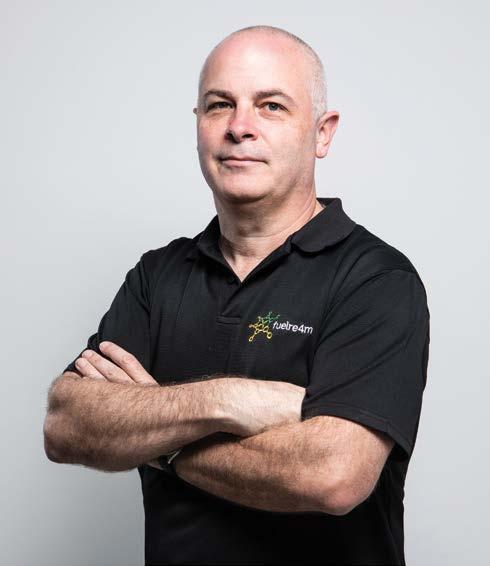
the implications of the energy transition on their business models and ensure ample investment on developing their workforce to support these significant changes.”
Deeply connected to the UAE Consensus is another issue that was at the forefront of the COP28’s decisions: fossil fuels. In what was a landmark moment for COP history, over 200 nations recognized the need to transition away from fossil fuels. But while such an energy transition seems like a highly encouraging option on
paper, things aren’t necessarily as black and white as they may appear- this is as per Robert Mortimer, founder and CEO of Fuelre4m, a UAE-based energy solutions startup that aims to optimize the use of fossil fuels while creating a feasible shift towards renewable energy. “COP28 delivered a stark message: despite global ambitions to phase out fossil fuels, we simply don’t have the technology to do so yet,” Mortimer adds. “This isn’t just an inconvenient truth, it’s the reality we’re living with. All emerging technologies, from
hydrogen to electric alternatives, require immense research and development, and That research and development (R&D) is progressing far more slowly than most would like to admit. COP28 made it clear that fossil fuels are here to stay for the foreseeable future, likely the rest of our lifetimes. The challenge isn’t whether we’ll continue using fossil fuels but how responsibly and efficiently we can use them. At Fuelre4m, we see a critical issue that COP28 highlighted: the misconception that alternative fuels are a near-term solution.”
Mortimer then adds that his company’s vision avoids change for the sake of change in a post-COP28
UAE. “We need responsible, incremental improvements to fossil fuel use; improvements that reduce emissions today, not in some distant, idealized future,” he adds. “Fuelre4m is committed to bridging the gap between today’s energy demands and tomorrow’s sustainable solutions by prioritizing smarter, cleaner combustion. COP28 reinforced what we’ve always known: the future of energy isn’t about abandoning fossil fuels abruptly; it’s about transforming how we use them, one efficient, low-impact step at a time. Hydrogen, for example, still has massive roadblocks—not only in engine technology but in production, storage, and distribution, all of which are decades from viable, large-scale implementation. In fact, the emissions from well-to-wake or well-to-wheel for many alternatives are currently higher than those from traditional fossil fuels. Transitioning too quickly,
If this agreement is to get traction, we need serious action.” COP28 President Dr. Sultan Al Jaber on the UAE Consensus’ goals
without addressing these core issues, could mean swapping one environmental problem for another. Our mission has always aligned with making fossil fuels as clean and efficient as possible.”
But whether a company is using fossil fuels efficiently or transitioning away from it, perhaps the current biggest asset in ESG policy-making is data. And according to Chalhoub Group’s Bulte, efficient use of data is the key to uncovering the potential of the UAE Consensus’ targets. “We can only rejoice that many UAE companies have positively responded to the goals,” Bulte adds. “However, the accurate quantification and analysis of sustainability data remains a major challenge. As the saying goes, “What gets measured, gets managed.” For any companies to make a tangible impact, they must adopt a data-driven approach to sustainability. Here we can only share our own journey. For Chalhoub Group, the starting point was the implementation of a comprehensive ESG data management system. The objective was to gather critical metrics on energy consumption, carbon emissions, waste reduction, and water usage. For effective analysis, data analytics tools and AI tools help drawing insights from complex datasets. Once data is collected and analyzed, we focus on materiality assessments to identify which sustainability issues most impact our business and stakeholders. This allowed us to prioritize high-impact areas and set meaningful, targeted goals.”
Aity metrics- helping businesses ensure accountability and transparency in their ESG initiatives.”
But while the discourse on sustainability data usually lingers around how to gain it, there is a need for equal attention to be given to its content and relevance as well. Introducing this tangential discussion is, again, Fuelre4m’s Mortimer.
A STRATEGY IS A CONVERSATION, YOUR PURPOSE AND ESG GOALS WILL LEAD A PATHWAY TO ACHIEVE YOUR STRATEGY, YOU SHOULD ALWAYS BE CHALLENGED BUT REMAIN TRANSPARENT AND COMMITTED.
“When it comes to emissions, relying solely on CO2 as a metric is dangerously simplistic, it overlooks the broader spectrum of pollutants,” Mortimer warns. “CO2 may be the most tracked, but other harmful gasses like methane and nitrogen oxides (NOx) are often ignored, despite their exponentially higher warming potential. Methane, for instance, traps over 80 times more heat than CO2 over 20 years, and NOx contributes significantly to both global warming and human health issues. For UAE companies serious about sustainability, my advice is this: stop measuring emissions by volume and start focusing on mass-based metrics, as fuel combusts by weight. Accurate sustainability data should consider all emissions and fuel types to ensure true, like-for-like
→ PETER HENDERSON is the founder of Eat-2Grow Food (E2G Food), a UAE-based social enterprise producing protein-rich food bars designed for communities and first responders with limited access to nutritious food.
ccenture’s Rigato, on the other hand, notes that leveraging the power of advanced technologies -especially AI- is key to effective data analysis. “AI’s unparalleled data-harnessing capabilities make it an integral tool in boosting sustainability,” Rigato says. “AI is enabling green investors to better assess climate risks and is helping optimize processes and kindle innovation. Some 50% of carbon reductions needed to get to net zero have not yet been invented. Accenture is encouraging energy sector companies among others with legacy infrastructure issues, to reinvent themselves with a strong digital core. A whole-of-organization approach to digital transformation, will go a long way in making them future-ready and limit their environmental footprint. AI enhances the precision and efficiency of tracking and reporting on sustainabil-
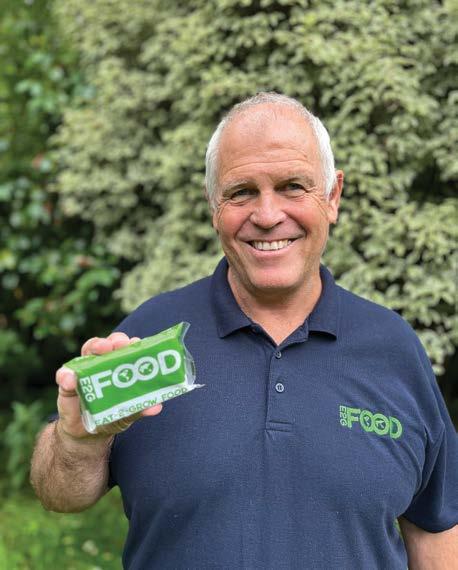
THIS GENERATION HAS THE OPPORTUNITY TO SOLVE THESE PROBLEMS, AND MAKING SUSTAINABILITY FUN AND ACCESSIBLE IS KEY… THROUGH COLLECTIVE ACTION, WE’RE BUILDING A MORE RESILIENT, CIRCULAR ECONOMY.”
comparisons. This means analyzing fuel usage by weight and using advanced data analytics to assess the complete emissions profile, not just CO2 output.”
Now, amid all these technical know-hows, as important as they are, Peter Henderson, founder of UAE-based social enterprise Eat-2-Grow Food (E2G Food), mentions the need to incorporate something that can eventually bind all sustainability strategies together: purpose. Indeed, that is the only way to avoid “greenwashing” an entity’s ESG ambitions, he notes. “Think about transparency, authenticity and long-term perspectives for partnerships,” Henderson says. “Do their purposes align with yours? How can you best support each other to make a change? Always conduct research. If you are a small company, then partner with an established organization to research partners you want to work with and ask about partners within the ecosystem. A strategy is a conversation, your purpose and ESG goals will lead a pathway to achieve your strategy, you should always be challenged but remain transparent and committed.”
Henderson is the right person to talk to about purposeful decision-making. After all, it was during his time as a cameraman for the popular news channel BBC that he was inspired to create E2G Food, a venture that produces protein-rich food bars designed for communities and first-responders with limited access to nutritious food. “When I was a BBC cameraman reporting from the chaos of war crises and natural disasters, I witnessed firsthand the resilience of communities and the dedication of frontline heroes, and although they were receiving food, it gave them a
→ Hachem Mahfoud is the Director of Replate, a US-grown food recovery platform that leverages technology to manage the donations of surplus food to communities in need and has been operational in the UAE since 2021.

sugar or carb spike that didn’t sustain them,” Henderson recalls. “It was in these moments, and in the discussions that followed, that I knew an innovative way of feeding people had to be created- one that provided slow-release energy and that could be eaten straight away. The E2G Food bar was thus created. A high-protein, nutrient-rich bar with 500 calories and made with natural ingredients, including dates, oats, nuts and nature’s superfood, spirulina was designed for humanitarian relief and first-line responders. With no refrigeration required, an 18-month shelf life, halal certified and FDA-approved, our Food bars are the future of nutritious food relief.”
With a Dubai-based production facility, E2G Food’s mission found additional validation when the city hosted the COP28 last year. “Reflecting on COP28, an aligned focused area with our core values is resilience,” Henderson notes. “Resilience for communities, resilience for better farming practices and resilience and adaptation solutions against climate change. As a social enterprise, we strive to provide the tools and resources and create partnerships that enable communities to empower themselves, this is the only way that we will create sustained nutritious feeding solutions for the future.”
Indeed, just as Henderson implies, the issue of food security is deeply linked with climate change. In an October 2022 article by the World Bank it is highlighted that the “global food system is responsible for about a third of greenhouse gas emissions—second only to the energy sector; it is the number one source of methane and biodiversity loss.” And with food production comes the issue of food waste. A September 2024 study by the UNFCCC shows that food loss and waste account for 8-10% of annual global GHG emissions, whereas a November 2024 report by the United Nations Environment Program (UNEP) shows that urban waste will rise from 2.1 billion tonnes in 2023 to 3.8 billion tonnes by 2050, costing the global economy up to one-fifth of available food.
Addressing the issue of food waste head-on is US-headquartered Replate, a food recovery platform that leverages technology to manage the donations of surplus food to communities in need, which made its way to the UAE in 2021. Since then, the startup has “rescued” over 150,000 meals in the UAE and subsequently diverted more than 150,000 tons of CO2 emissions. “For Replate, COP28 marked a natural extension of our work in Dubai, as we have been the official food rescue partner for Expo City Dubai since Expo 2020,” reveals Hachem Mahfoud, Director at Replate MENA. “Throughout the two-week event, we collaborated with businesses and government entities to collectively recover close to 10,000 meals, showcasing the power of structured, data-driven food recovery efforts. COP28 provided a powerful platform for public and private sectors to unite around sustainability, creating opportunities for businesses and government entities to align their goals. This shared momentum has underscored the growing interest of UAE companies in tracking sustainability data—such as meals recovered, water saved, and CO2 emissions reduced—and reporting their contributions to the UNSDGs. With the UAE’s goal to reduce food waste by 50% by 2030, led by the National Food Loss and Waste Initiative (Ne’ma), this readiness has strengthened our ability to help organizations directly address these critical targets. This focus on measurable sustainability outcomes has allowed Replate to further engage organizations eager to support the UAE’s national goals, helping them adopt practical, impactful food recovery practices. The result is an expanded network of partners in the UAE working to create a zero-waste ecosystem and a meaningful contribution toward global climate goals.”
In the months following COP28, Replate has aggressively followed up on its initial success with a number of collaborative projects- one of them being Feed the Future, in collaboration with UAE’s retail and hospitality giant Majid Al Futtaim, that saw the startup partner with vendors at Dubai’s Mall of the Emirates to schedule and
manage donations with the UAE Food Bank. “This impactful initiative, held last Ramadan, enabled over 50 brands across multiple malls to rescue more than 10,000 meals,” Mahfoud shares. “The response showed that every meal counts, and the influence extended to a substantial number of businesses within a short program duration— highlighting the power of shared goals. As we continue to tackle the challenges of food waste, it’s essential to stay positive.”
Indeed, Mahfoud’s advice to fellow entrepreneurs and business stakeholders who are serious about creating a sustainable future is to balance innovation with optimism. “While the issue is significant, it’s also solvable with the right blend of collaboration, creativity, and AI!” he adds. “With these tools, Replate’s food rescue efforts will become more efficient and scalable, driving real change. This generation has the opportunity to solve these problems, and making sustainability fun and accessible is key, as data alone doesn’t always connect with people. Through collective action, we’re building a more resilient, circular economy, setting an inspiring path forward for both businesses and communities.”
Mahfoud’s words of encouragement, in many ways, bridge back to the concept of collaboration that this article started off with. But even with synergistic goals and combined initiatives, businesses in the UAE must now be careful to not jump into ESG initiatives in haste, advise Chalhoub Group’s Bulte and L’Oréal Middle East’s Duffier. “To achieve lasting sustainable development, the UAE business landscape should prioritize gradual pacing, strategic partnerships, and innovation when setting sustainability targets,” Duffier says. “At L’Oréal, we believe that setting realistic, phased ESG goals allows companies to build momentum responsibly without overwhelming resources, ensuring that each step is measurable and impactful. By pacing ESG ambitions thoughtfully, prioritizing partnerships, and investing in cutting-edge solutions, UAE companies can build a robust framework for meaningful and lasting sustainable development. This approach not only benefits individual organizations but also strengthens the UAE’s collective path toward a greener future.”
“The focus should be now on aligning ambitions with both global standards and local realities, ensuring that targets are measurable, actionable, and achievable,” Chalhoub Group’s Bulte adds. “As we move toward a sustainable future, businesses must adopt a “measure first, act smarter” approach, ensuring that they have the right data, processes, and frameworks in place to drive informed decisions. To protect themselves from trying too hard too quickly, companies must recognize that sustainability is a journey—a marathon with no finish line.”
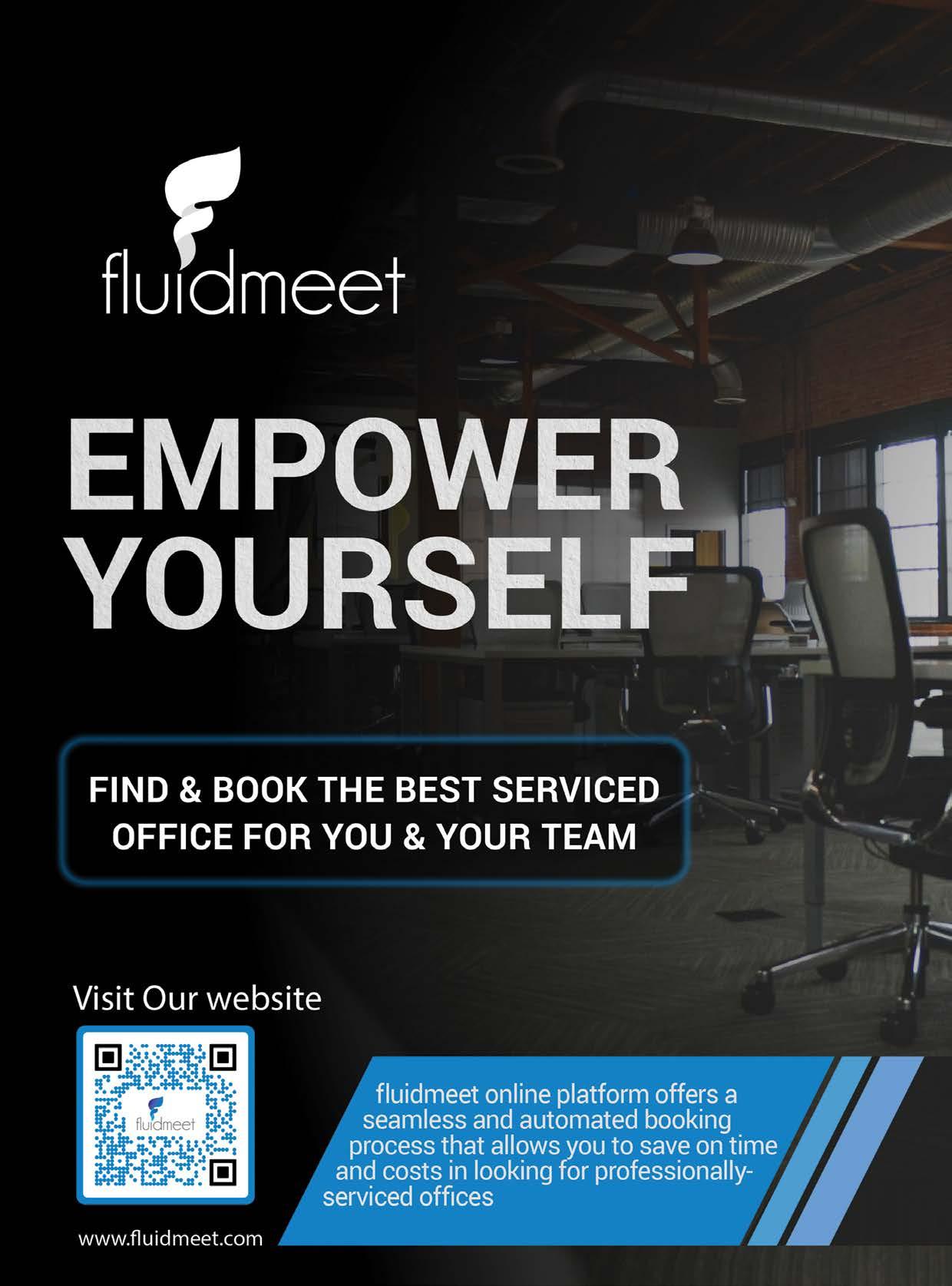
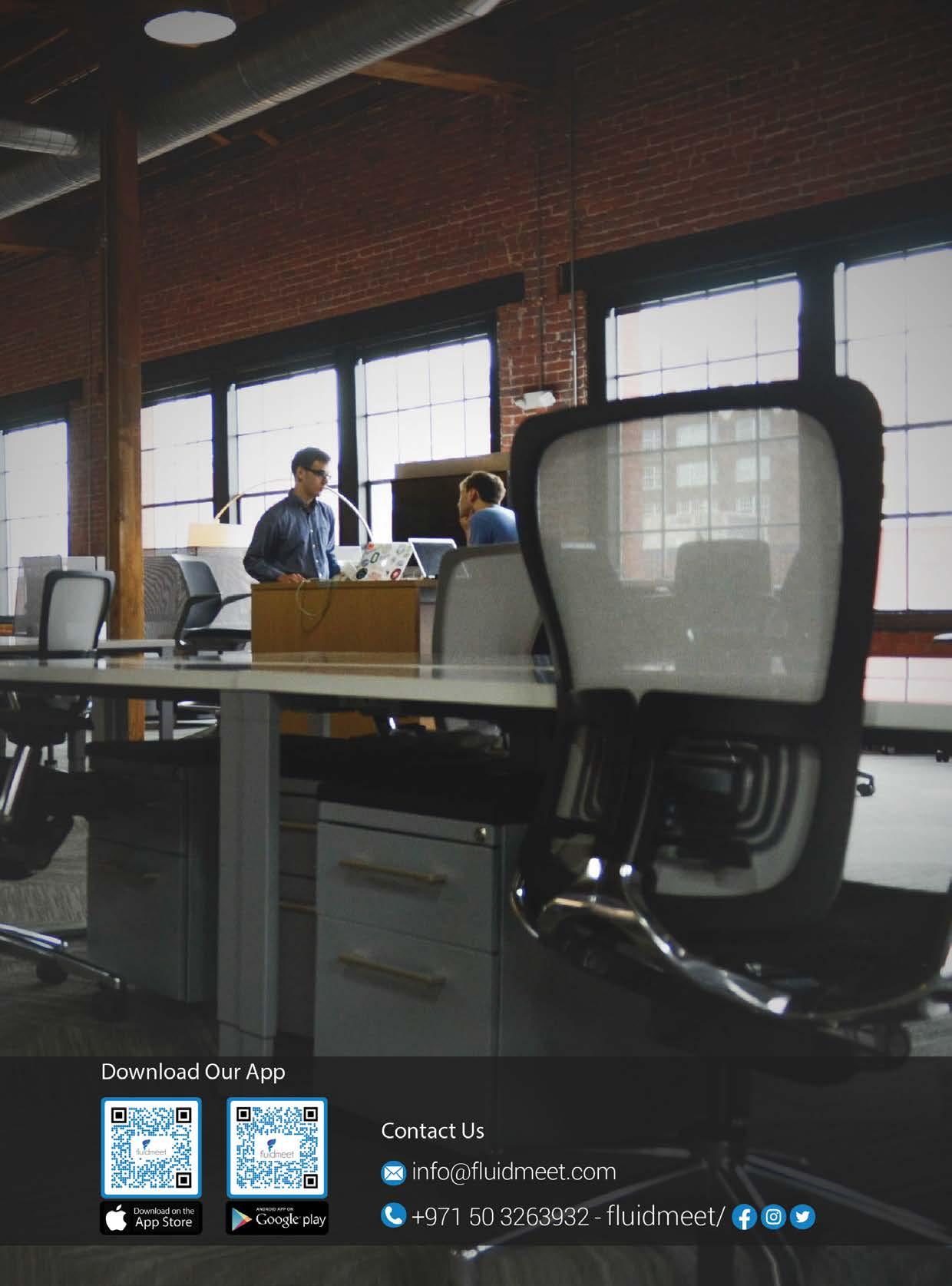


Insights from a 10-year-old entrepreneur on how to turn failures into learning opportunities by ALDHABI
Your first year in business is usually full of challenges but also success. While success is more rewarding, it’s common to have failures on your way that teach you valuable lessons. When I first established my own bookstore, I thought it would just be a matter of stocking books and selling them- that was a huge mistake. When I was ready to sell, there wasn’t any customer to buy, so from there on I started to go back and see what I should implement to reach my customers. From there I started to take more courses about how to market my bookstore in a proper way, I started to view my unplanned obstacles as learning opportunities that can shape myself and my business and lead to success.aesthetically pleasing:
WHEN YOU PLAN SOMETHING, BUT YOU SUDDENLY GET SOMETHING UNEXPECTED, TAKE A STEP BACK AND HAVE EVERYTHING IN FRONT OF YOU, TO ANALYZE AND EVALUATE THE SITUATION.”
It’s very important to know that failing a task or a project is very normal and happens often as part of entrepreneurship. Even big names and successful entrepreneurs have faced challenges on the way to success. What makes them successful is that they embrace failure and learn from their failure. If you understand the concept behind failure and turn it into an opportunity to improve or grow, you can turn over challenges with a very positive thinking.
When you plan something, but you suddenly get something unexpected, take a step back and have everything in front of you, to analyze and evaluate the situation. You should always ask yourself, “what was wrong or not considered?” and “why?” Understanding the cause of that failure will help you to avoid making the same mistake in the future. I usually have it all in front of me on my desk to just remind me of what happened and need to take care of it next time. For example, if your marketing strategy didn’t catch any sales or bring new interested customers, have a look at the
methods you used. Did you target the right audience? Was your message clear and engaging? By studying such things before doing the campaign you will be prepared to modify your advertisement next time.
Once you know what was wrong, now it’s time to make some changes. In this step the real learning happens! Some people adjust the business model, remake their products, or even change their marketing strategies, because without creating the changes you will never know it’s right unless tested.
problems in the future. Resilience is about having positive actions and continuing to believe in your vision, even when things get hard. When you focus on your long-term goals you will

AlDhabi AlMheiri is a young Emirati columnist, entrepreneur, and publisher as well as a Guinness World Records titleholder. As the
RESILIENCE IS ABOUT HAVING POSITIVE ACTIONS AND CONTINUING TO BELIEVE IN YOUR VISION, EVEN WHEN THINGS GET HARD.”
If you are changing or modifying your original ideas or plan that doesn’t mean your idea wasn’t good- it just means you are refining to make it a better and stronger idea. Being flexible to adopt, change and improve is the nature of entrepreneurship.
One of the success keys for entrepreneurs is the ability to step back after a setback- it is crucial in the world of business. Every time you come across a challenge, you become stronger and resilient to better deal with such
be able to step forward and face setbacks. You shouldn’t be afraid of failure; it’s always a new opportunity to learn and know more things that could make you and your business better. Never be afraid to ask for help or share your challenges with others who you really know would help you, because then you can turn challenges into opportunities for growth. Remember that every successful entrepreneur has gone through failure too, and it’s how you respond to these challenges that will shape your future success.
founder of Rainbow Chimney Bookstore and Publishing House, she is committed to empowering young writers and promoting cultural diversity through the transformative power of storytelling and publishing. AlDhabi firmly believes in the power of stories, providing children with a chance to express their thoughts, feelings, and experiences through books. As the author of two books and the publisher of over 52 works by children from diverse backgrounds, AlMheiri’s mission is to promote education, sustainability, financial
literacy, and emotional resilience through narrative. Her initiatives, such as “Books from Children to Children,” foster creativity and self-expression among youth while addressing crucial social issues like diversity, inclusion, and emotional well-being.
In addition to her work in literature, AlMheiri is a passionate advocate for children with additional needs, ensuring that their voices are amplified and their unique talents are recognized and nurtured. Her enthusiasm for finance has also driven her entrepreneurial ventures, making her a role model for young aspiring business leaders.
AlMheiri’s commitment to education and personal development is exemplified by her academic achievements. She graduated as a Fellow from Georgetown University’s School of Business in 2024, in collaboration with the US Mission to the UAE, and successfully completed the Entrepreneurship Program offered by Google and the UAE Ministry of Economy.
Through her work and vision, AlMheiri is leaving a lasting impact on young people, advocating for a future where education, storytelling, financial literacy, and sustainability are the cornerstones of societal progress. Her initiatives are deeply aligned with the United Nations Sustainable Development Goals (SDGs), reflecting her dedication to creating a better world for future generations. rainbowchimney.ae
To begin with, please give us an overview of the media sector locally/regionally and globally.
There has never been a more exciting time for our sector. Between the advancements in artificial intelligence (AI) and the proliferation of audiences across social media platforms, the media industry—especially legacy brands—must reinvent themselves completely or face being left behind or even becoming extinct.
Equally, media owners and brands are more in touch with their audiences and are constantly evolving to improve their chances of thriving.
In this new era, creativity and content will be critical. We’ve seen how individuals—podcasters, YouTubers, TikTokers, and other content creators—can shape public opinion and even influence global events. Media organizations need to adapt by embracing these new platforms and recognizing the power of authentic personalities to engage and build trust with audiences.
Regionally, the Middle East is uniquely positioned to lead in this transformation. The UAE and Saudi Arabia, for instance, are among the top users of platforms like TikTok, reflecting the region’s digital-savvy, mobile-first population. The demand for interactive and culturally relevant content is growing rapidly, and this presents incredible opportunities for innovation and growth.
How is IMI positioned in the media industry, regionally and globally?
Regionally, we have a distinguished portfolio of leading media brands, which include Sky News Arabia, The National, Al-Ain News, and CNN Business Arabic. Each of these brands has its own identity and unique consumer proposition, but share a commitment to delivering high-quality, best in class journalism
with a digital-first mindset. We also focus on ensuring our journalism covers all sides of any given story, empowering our audiences with the information they need to make informed decision about the world around them.
Globally, via our investment vehicle Redbird IMI, we are investing in world class, profitable media assets in the news, sports and general entertainment space to ensure we have a robust portfolio of local, regional and global assets that position IMI as a global media powerhouse. Finally, our commitment to talent development and fostering the next generation of media leaders is something we take very seriously. Through initiatives like the IMI Media Academy, we are shaping the next generation of media professionals, ensuring that we remain at the forefront of creativity, innovation, and excellence.
Media organizations need to adapt by embracing new platforms and recognizing the power of authentic personalities to engage and build trust with audiences.” “

→ RANI R. RAAD, CEO of IMI, and President and Operating Partner of Redbird IMI.

With IMI, you aim for the UAE and the region to play a bigger game in the global media sector. How is this ambition translated into IMI’s current and future offerings?
As a leading media group, we recognize our responsibility to support the advancement of the media sector.
With audiences at the heart of what we do, our content strategy focuses on producing stories that resonate with both local and international audiences. We prioritize authenticity, ensuring that our coverage reflects the diverse perspectives of the Middle East while making these narratives accessible and relevant to global audiences.
Technology also plays a key role in achieving this ambition. We are integrating AI and data-driven tools to personalize content, improve audience engagement, and enhance the overall media experience. These innovations not only strengthen our offerings but also position us as leaders in the industry.
At the same time, we are investing in people. By empowering talent— whether through training programs, collaborations, or partnerships—we are ensuring that the region’s brightest minds are driving this transformation. Our goal is not just to participate in the global media landscape but to shape it.
What are some of the most important metrics that you focus on to assess IMI’s performance and growth potential?
At IMI, we believe that success goes beyond traditional metrics like reach. We are increasingly focused on metrics that reflect long-term engagement and impact.
The region has one of the most crowded news media landscapes in the world. To cut through the clutter and the noise, it is essential that our content is relevant, relatable, authentic, and credible. Coupled with creative execution, smart tech, and powered by data and insight, this ensures we are targeting the right audiences, and this is what drives engagement. Talent is another key metric for us. Building a strong organizational culture that attracts, retains, and nurtures top talent is a major priority. I firmly believe that our people are our greatest asset, and their success is a direct reflection of our organization’s success.
What have been the biggest challenges you have faced in reaching your goals for IMI? One of the biggest challenges is time. Building a strong culture and aligning teams around a shared vision is not something that happens overnight. Transformations like this require patience,
↑ Abu Dhabi-based
group

perseverance, and a willingness to navigate resistance to change.
Another challenge is data. While digital platforms provide more data than ever before, making sense of it and integrating it into a cohesive strategy can be complex. We’ve had to focus on building the right infrastructure and expertise to ensure that our data is actionable and aligned with our goals.
Finally, adopting new technologies like AI comes with its own set of challenges. It’s not just about implementing these tools but ensuring that they’re used effectively and ethically. This requires significant investment in training and creating a culture that embraces innovation.
What are some of the most important projects you are focusing on right now?
There are several exciting initiatives underway at IMI. First, we’re making significant investments in AI and other technologies to enhance productivity and improve our storytelling capabilities. AI is not just a tool for efficiency; it’s a way to create more engaging and impactful content for our audiences.
We’re also moving to a new headquarters, which represents a fresh chapter for IMI. It is a state-of-the-art building that features various unique, immersive experiences for our visitors and will foster collaboration, creativity,
and innovation amongst our people, empowering our teams to do their best work.
On the content front, our brands are continuing to innovate in what they deliver to audiences, with a host of new programs and content lined up for the months to come.
“
To cut through the clutter and the noise, it is essential that our content is relevant, relatable, authentic, and credible.”
'TREP TALK
IMI
CEO Rani R. Raad Advises Media Executives in the UAE
} FIRST, EMBRACE INNOVATION, but do so with purpose. It’s not enough to adopt the latest technology for the sake of it. Focus on how these tools can enhance audience engagement, build trust, and make your content more relevant.
} SECOND, FIND THE BALANCE BETWEEN LOCAL RELEVANCE AND GLOBAL APPEAL. The UAE has a unique voice, and staying connected to local narratives while thinking globally can elevate your organization’s impact.
} FINALLY, PRIORITIZE YOUR PEOPLE. Talent is the backbone of any successful media organization. Foster a culture of learning, collaboration, and inclusivity. Invest in your teams, and they will drive your success.
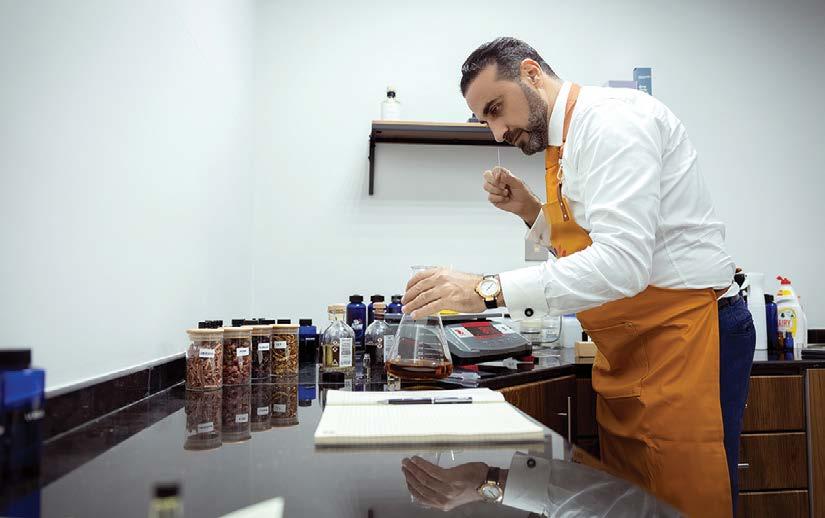
Entrepreneur Middle East sat down with Hasan Azrak, founder and CEO of Dr. Scent, about his success in the field of perfumes and ambiance fragrances.
The cultural influence of fragrance has long played an important role in people’s lives in the East, and more specifically in the Gulf region. Perfume has been closely linked to lifestyle, and has established deeprooted traditions in using air fresheners in living and public spaces. Numerous brands have become well-recognized, achieving significant popularity in that field.
Since there is a need for new companies in the field of perfumes to understand the culture and traditions of the region,
Entrepreneur Middle East sat down with Hasan Azrak, founder and CEO of Dr. Scent, to learn how he has succeeded at developing new uses for fragrances in living and public spaces, the importance of perfumes, especially ambiance fragrances, their new uses and diffusion everywhere.
Azrak also talked about his unique experience in establishing a company specializing in perfumes and ambiance fragrances, and his role in developing the concept of the uses and diffusion of fragrances in innovative ways.
How was Dr. Scent founded and what gap in the market were you seeking to fill?
Dr. Scent was founded to provide a distinctive fragrance experience using advanced nanotechnology that transforms essential oils into a fine, long-lasting mist, ensuring a luxurious and sustainable fragrance experience that was not available in the market.
Can you share some of the challenges you faced when launching Dr. Scent, especially in the competitive ambiance fragrance market?
The challenges were to stand out in a competitive market. Our focus was on providing products with non-toxic ingredients and innovative technologies to ensure safety and luxury, which helped us attract customers looking for quality and innovation. In Middle East culture, we notice a strong connection with perfumes.

How has this cultural background influenced your approach to scent diffusers?
We relied on our deep understanding of the region’s aromatic preferences, and provided scented experiences that fit the local culture using advanced technologies that ensure the consistency and diffusion of the fragrance everywhere.
What unique opportunities did you find in the Middle East market that contributed to the growth of Dr. Scent?
The importance of our work lies in providing a wide range of essential oils that meet the various tastes and needs of the region, while integrating advanced technologies, and therefore enhancing the customer experience with our global experience while focusing on local needs.
HONESTLY, I ENTERED THIS FIELD BY CHANCE, AS I NOTICED MANY GAPS IN IT. I THEN DECIDED TO CONTRIBUTE TO ITS DEVELOPMENT THROUGH IN-DEPTH RESEARCH AND DEDICATION, UNTIL I BECAME AN EXPERT NICKNAMED “THE PERFUME DOCTOR.”
What strategies helped in effectively expanding your business in the region? Did partnerships play an important role in this?
We have fostered successful partnerships in the past, but currently, Dr. Scent is distinguished by its focus on centralized decision-making and expanding our network of agent partners to strengthen its leading position on a global level. Thanks to our global presence and deep understanding of regional preferences, we were able to provide fragrance solutions that suit every local market. We are keen on continuous innovation,
based on customer feedback and modern market trends, which helps us meet the needs of our customers effectively and successfully.
The market is increasingly moving towards integrated smart solutions. Are there solutions or plans for development?
Yes, we are the first global company to develop smart fragrance diffusers that can be controlled via smartphone applications or home automation systems. These devices will allow customers to fully customize the fragrance experience, in terms of
time, intensity and scent, providing an integrated fragrance solution that is compatible with modern technological developments. This step is part of our strategy to provide integrated fragrance solutions in line with the changing needs of the market.
What are the biggest challenges you faced and how did you turn this challenge into success?
I do not consider them to be challenges, but obstacles to overcome, which led to a special focus on quality and continuous creativity in innovating fragrance devices and launching a new scent almost every month depending on the seasons, occasions, and the demanding needs of each market. Understanding different tastes in global markets and meeting consumers’ desires was the most important challenge for us, in addition to the traditional challenges that every businessman faces when entering global markets, such as economic, natural and cultural factors.
What about your experience as an entrepreneur, and what would you say to new entrepreneurs when starting new brands?
Perseverance, self-motivation, leadership, and positivity form the foundation of our success. We must work to build a cohesive work routine that allows us to overcome challenges, and be prepared to face any negative influences. It is also
important to form a creative and integrated work team that adopts and believes in the company’s mission, which contributes to enhancing the collective spirit and achieving our common goals.
How do you align your products with the theme of sustainability, and do you think customers are keen
on protecting the environment?
We are proud to use recyclable and environmentally friendly oil bottles made by Dr. Scent. We also confirm that all our perfumes are free of harmful gases damaging the ozone layer. Dr. Scent was distinguished by obtaining the international IFRA certificate, which reflects our commitment to


the highest standards of quality and environmental safety.
What are your plans to develop Dr. Scent and are you working on introducing new products or other markets?
Dr. Scent strives hard to be the undisputably first global company in the field of air fresheners. In a sense of humor, we are working hard to fully achieve the “Scenting the World” project, as we believe that beautiful scents can transform the atmosphere and bring a touch of happiness to every place.
What is the most important thing that influenced your journey as an entrepreneur? Honestly, I entered this field by chance, as I noticed many gaps in it. I then decided to contribute to its development through in-depth research and dedication, until I became an expert nicknamed “The Perfume Doctor.”
How do you view the role and impact of air fresheners on the lives of individuals and companies?
Many researches indicate that beautiful perfumes in different places contribute significantly to improving the overall mood and increasing productivity, especially in work environments. It is clear that the smell of a place is an integral part of its beauty. For example, an unpleasant odor can spoil the beauty of even the most elegant and sophisticated place.


Gadgets and doodads that you might’ve missed out on, sourced by a tech aficionado by TAMARA
CLARKE
/Acer Veriton NUC

With its slim and compact design, the Acer Veriton NUC is smaller than a traditional desktop PC, making it especially useful in narrow workplaces where space is limited and easier to transport when needed. Thanks to the VESA mount support, it can be conveniently hidden behind a monitor, optimizing space. The device integrates Intel® CoreTMUltra processors, enabling AI-assisted functions to enhance productivity and creativity. Powered


by advanced Intel® ARCTM graphics with 8Xe cores, the new Veriton NUC Series is ideal for large workloads that require parallel throughput. In addition, the new NUC supports 8K resolution displays, offering natural and sharp original quality. Thanks to its wide range of ports, the Acer Veriton NUC makes multi-tasking even easier. Equipped with HDMI, Display and Type-C ports, Acer's new NUCs support the connection of all necessary peripherals and offer a seamless user experience. The integrated full-function USB Type-C port with DisplayPort Alt mode allows Acer's new Mini PCs to connect directly to a display or monitor, while USB 3.2 Gen 2 supports speeds of up to 10 Gbps. Additionally, the new Veriton NUC Series supports the multi-screen configuration, allowing up to three displays to be connected simultaneously. The new Veriton NUC Series integrates the Wi-Fi 6E module that supports speeds of up to 9.6 Gbps, nearly 3 times faster than the 3.5 Gbps speed of Wi-Fi 5, improving performance and reliability. In addition, Wi-fi 6E also supports WPA3 encryption, improving security and protection against possible hacker attacks.
/HONOR X9c
HONOR X9c is packed with AI features powered by MagicOS 8.0. With AI Magic Portal, you can enjoy seamless navigation as the device intelligently directs you to the right apps. Furthermore, the camera is enhanced with AI Motion Sensing and AI Eraser, which simplifies photo editing by effortlessly removing unwanted elements from images. The HONOR X9c raises the bar for smartphone durability with its next generation of HONOR drop-resistant design. Enhanced with ultra-tempered glass and

Canon PowerShot G7 X Mark III
The PowerShot G7 X Mark III Is ideal for vloggers, bloggers, live streaming, video conferences and anyone posting content online. The camera features live-streaming capability to YouTube via a wireless connection, and also offers a variety of video options including vertical video support, 4K shooting up to 30P high-rate movie with no crop, full HD up to 120p, and an optical 4.2x lens, helping to achieve high image quality. You can capture landscapes in 4K clarity and record sports in slow motion with fast frame rates up to 120fps. Powered by the company’s DIGIC 8 image processor, a new 20.1 Megapixel sensor, and wrapped within a compact body with a microphone jack, the PowerShot G7 X Mark III offers innovative technologies, an improved user interface and Creative Assist for both video and still photography needs. The possibilities with the PowerShot G7 X Mark III are endless.
advanced protective shields, the HONOR X9c can withstand drops from heights up to 2 meters. Adding to this, it also features IP65M water and dust resistance and a three-layer waterproof structure to keep out dust and dirt. The HONOR X9c also introduces the industry’s first 6600mAh Silicon-carbon battery, which provides you with extended power to make it through the entire work day. On a single charge, you can enjoy up to 48.4 hours of music streaming and 25.8 hours of online video playback, making the HONOR X9c the perfect choice for consuming content on the go.
TAMARA CLARKE, a former software development professional, is the tech and lifestyle enthusiast behind The Global Gazette, one of the most active blogs in the Middle East. The Global Gazette has been welcomed and lauded by some of the most influential tech brands in the region. Clarke’s goal is to inform about technology and how it supports our lifestyles. Talk to her on Twitter @TAMARACLARKE theglobalgazette.com
From better goods to better wardrobe bests, every issue, we choose a few items that make the approved executive selection list. In this edition, our picks are from Breitling, Tod’s, COS, and Eight Sleep.
Tod's W.G. is the evolution of the brand’s iconic Winter Gommino ankle boots that defined the lifestyle in the nineties, leaving consumers to feel confident in transitioning their wardrobes perfectly from day to night. The W.G. has evolved with revised shapes and proportions, both available in the original ankle boot, and in a tapered shorter style desert boot made with the same high-quality suede and leather materials. Thanks to its lightweight and flexible rubber role, which is more practical than leather, and characterised by the rubber pebbles on the heel, it provides great functional features which make it an essential part of the cosmopolitan man’s wardrobe; allowing him to feel comfortable at any occasion. www.tods.com/ae-en

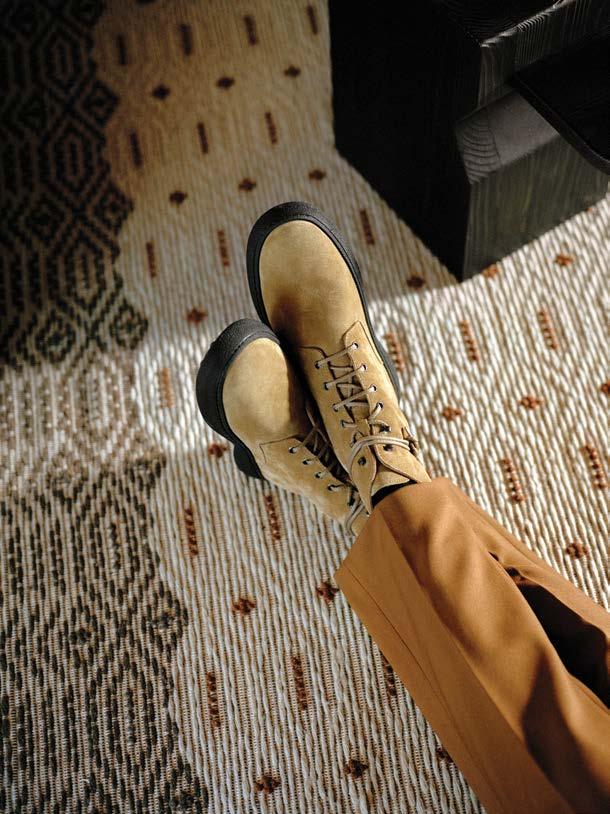
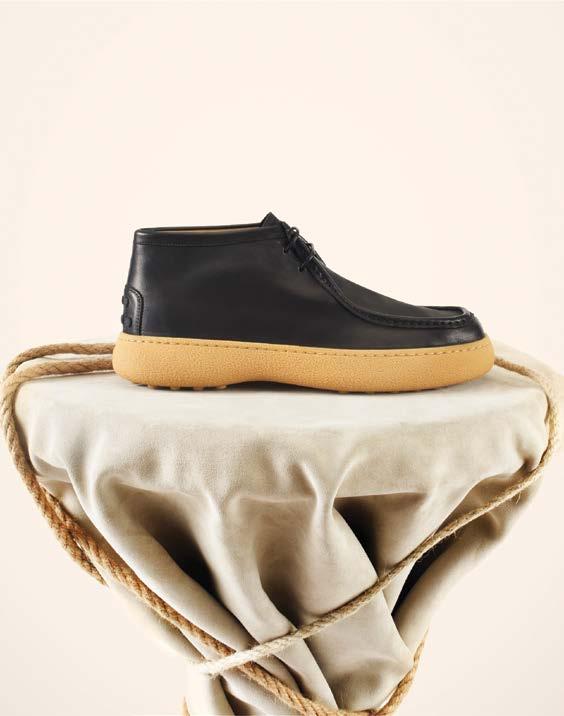

The World's first sleep fitness company, Eight Sleep, has expanded to the UAE! The brand -which has been a favourite of celebrities like Elon Musk, Mark Zuckerberg, Jessica Alba, and Scarlett Johansson- has its very own Pod technology, a smart mattress cover with advanced AI and health-grade sensors that automatically adjust cooling, heating, and elevation for optimal sleep. The latest model, the Pod 4 Ultra, is Eight Sleep’s most advanced version, offering enhanced biometric tracking and twice the cooling
power of previous models, making it ideal for combating the UAE’s hot summers. Additional innovations include snoring detection, adjustable sleep positions, and tap-to-control technology. Clinically proven to increase total sleep time, enhance deep sleep, and reduce snoring, the Pod 4 Ultra delivers a personalized, high-performance sleep solution tailored for the healthconscious that ensures comfortable and restorative sleep. www.eightsleep.com/ae/
BY CHRIS PERANI →/ COS
COS has announced a limited-edition capsule collection inspired by the work of Californian photographer Chris Perani. The 24-piece collection draws inspiration primarily from nature- an interest the London-based fashion brand shares with Perani who grew up surrounded by forests and dense marshlands and found himself captivated by the layers of the oftenunseen beauty he experienced. The new COS collection thus offers a series of prints and a variety of tactile materials including a classic white shirt that features a statement beaded applique of the wing. Revisiting wardrobe staples, an elegant long-sleeved dress, crafted in double-faced wool knit, is reimagined as a statement piece. Deep, rich colours, reminiscent of Perani’s work, are brought to life through digital prints applied to both sides of the fabric, creating a heavy weight yet fluid silhouette that
mimics the movements of nature. The capsule spanning womenswear, menswear and accessories launches online and in select COS stores in December 2024. www.cos.com/en
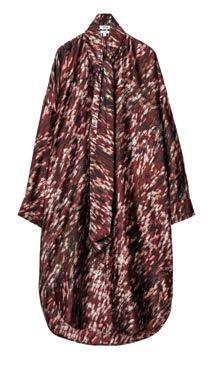




To mark the UAE’s 53rd National Day, Breitling has put together a list of some of its most colorful watches, inspired by the nation’s flag, that promise to add a touch of elegance to your closet. For men, there’s the limited edition Chronomat Automatic GMT 40 Middle East which, with its dual time zone display and easygoing aesthetics, is presented in a new special design that reflects the brand’s 140-year anniversary theme. There’s also the Avenger B01 Chronograph 44, whose stainless steel versions come with a choice of military leather strap with a folding-pin buckle or three-row stainlesssteel bracelet with micro-adjustable folding clasp. For the ladies, there’s the iconic Navitimer Automatic 36 which comes in a cream-colored dial, burgundy alligator strap, and features the beaded bezel and iconic circular slide rule that gives the Navitimer its unmistakable appearance and a jewelry-like appeal. There’s also Super Chronomat Automatic 38, with its appealing choice of dial colors as well as choice of bracelet or strap. Whatever your pick, these timepieces are guaranteed to make a statement. www.breitling.com

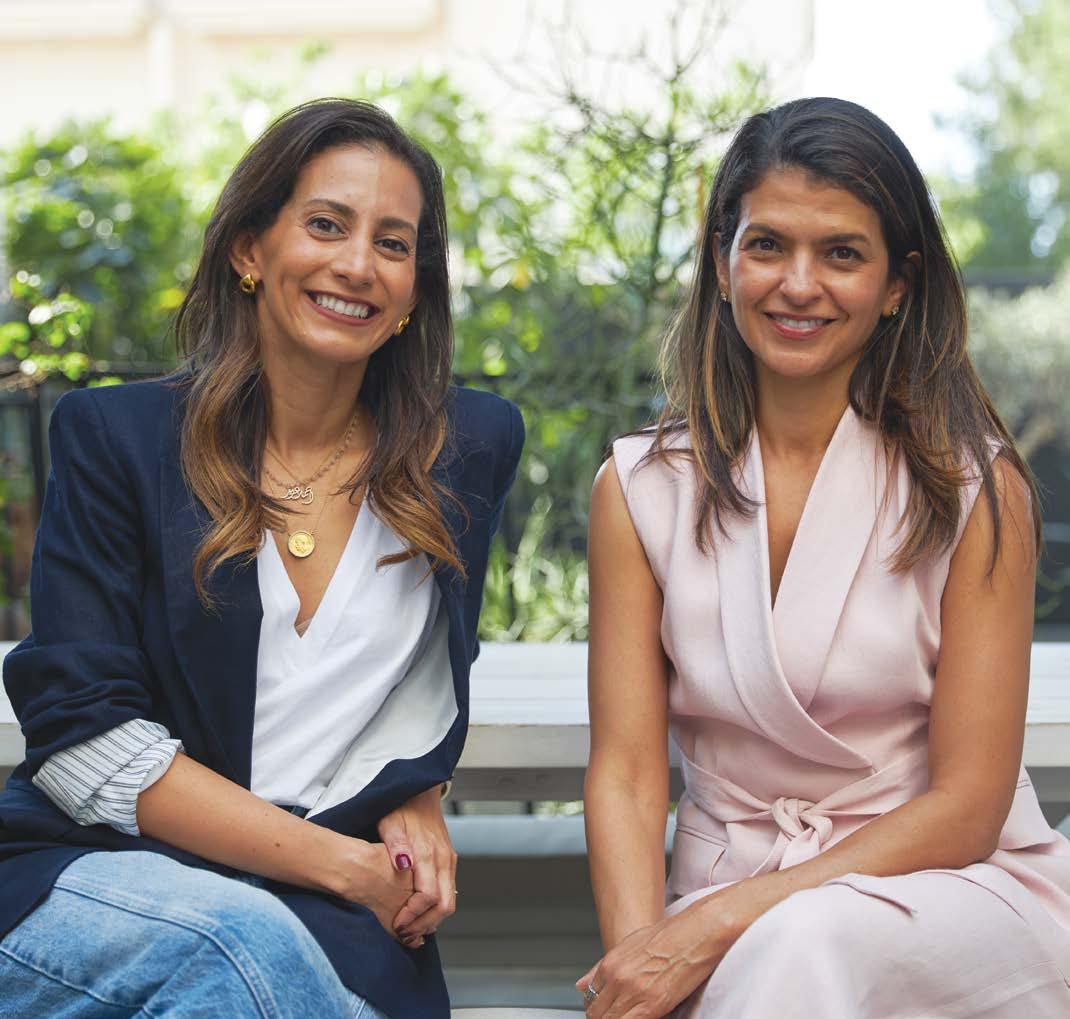
Heba Elgabaly and Dina Elhaddad, co-founders of Cairo-headquartered Efreshli, on joining forces to disrupt the interior design industry across the MENA region. by TAMARA PUPIC
Cairo-based entrepreneur Heba Elgabaly has witnessed first-hand the interior design industry evolving. Only ten years ago, Elgabaly was an operator deeply embedded in the home furniture and design industry, where most designer products were out of reach for many and pricing was often non-transparent. Then, she noticed technology loosening the industry’s laces. “In Egypt, Instagram started to really take off in our industry around 2013,” she recalls. “That’s when many brands started going online, product discovery skyrocketed, and customers needed curation from different places. People started sending me photos of furniture from other places asking for advice for a room or small space. There was no one serving this gap in the market yet. That’s where I started to see that interior design was changing.”
Elgabaly spent nine years as a partner at Eklego, a Cairo-based architecture, interior, and furniture design firm, where she always felt that there was a large segment of the market that could benefit from design services, and technology was starting to allow for more transparency, accessibility, and collaboration.
These three features have become guiding lights for her startup Efreshli. “I started up Efreshli in 2019, when I had already built a
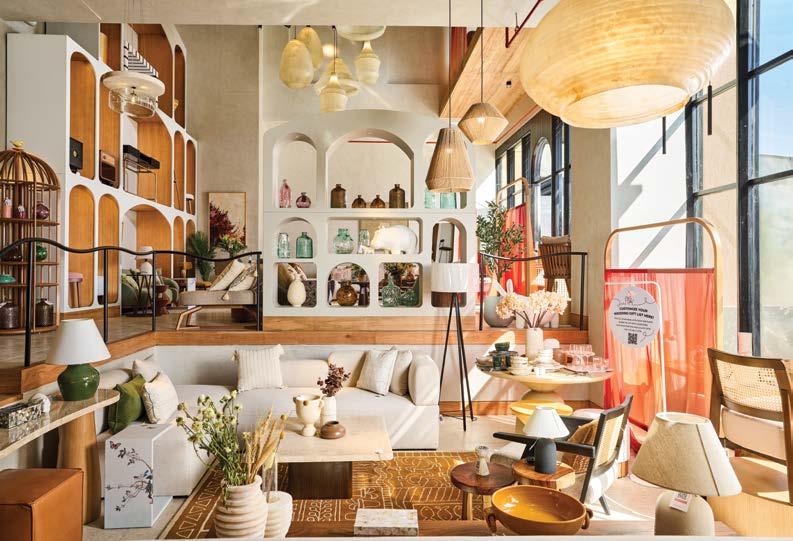
very strong network with interior designers and furniture brands,” she says. “When you create an online platform, there is the question of who to get on first- the suppliers or the customers?
Ideally, it’s the suppliers, and that’s much easier if they trust you,” she says. “For Efreshli, the suppliers all came onboard, they welcomed the idea, it would help showcase their products, they loved the way it looked because we paid a lot of attention to the design and quality of the visualization.They also had nothing to lose as they would only pay if their products were sold and we charged low commissions.
“Along the way some people tried to convince me to increase the fees, they felt it was worth more and people would pay for it. But for me accessibility was a key part of our mission and that’s what we were doing differently than others,” she added. “Once we had a critical mass of brands online the customers started to flow in, they could purchase from any brand and it was possible to do just one room, which made it affordable and convenient and this was something new because interior design had been limited to full home projects and a premium segment. To make it accessible, there had to be a tech component to it, and from the beginning we hired both designers and software engineers to work hand-in-hand.”
Today, Efreshli provides convenient furnishing and design services to help create a more accessible home shopping journey, all online.
The platform showcases and sells thousands of products from over 200 of Egypt’s top brands, and these collaborations are due to Elgabaly’s strong ties within the industry.
Over the years, Efreshli has developed a strong network of
ecosystem players within the design and home space, facilitating interaction among stakeholders to drive innovation in the industry as a whole. With its 60-strong team, it now combines expertise in interior design, technology, marketing, and operations. Its growth potential did not go unnoticed by investors. In 2021, Efreshli raised a US$550,000 seed funding round, led by angel investor Tarek Sakr and property developer Marakez. More recently, it completed its seed funding round, led by Algebra Ventures, an Egyptian tech-focused venture capital firm, with participation from San Francisco-headquartered venture fund 500 Global (formerly 500 Startups), Dar Ventures, the venture capital arm of design and engineering consultancy Dar, and angel investors.
The new capital will be used for enhancing Efreshli’s offerings and expanding its product line; however, the fundraising process has also brought additional (and rather less common) benefit to Elgabaly and Efreshli. “Investors and I were talking about a co-founder for Efreshli, and I said that I was looking for someone in tech or product,” Elgabaly recalls. “Laila at Algebra Ventures said, ‘I think I know someone.’ She’s in San Francisco and she’s at Google.’ I’m like, ‘Really?’ I was skeptical because I had been interviewing people all the time, but I agreed for Laila
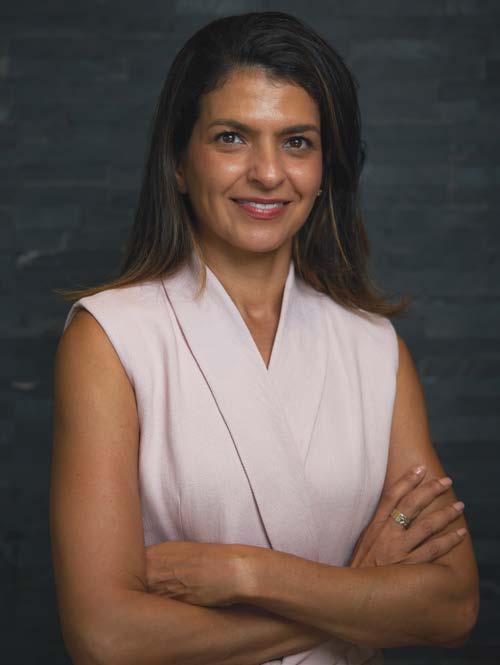
advisory board at Efreshli, and the two started having regular bi-weekly calls. “There weren’t any expectations besides advising the company, so we were able to have very honest discussions, get to know each other, understand our values, share our thoughts about where the company should be going,” Elhaddad says. “When it was time for me to really consider that opportunity, I had already been really comfortable with Heba.
That was the biggest part of the decision, besides believing in the company and its potential. Having the right partner and believing that you can succeed and achieve your shared ambitions and goals together is crucial.”
However, Elhaddad
WE WERE ABLE TO CREATE A CONVENIENT AND ACCESSIBLE INTERIOR DESIGN OFFERING IN EGYPT, BUT IT’S NEEDED EVERYWHERE. WE’VE BUILT SOMETHING THAT CAN WORK IN DIFFERENT MARKETS WITH CERTAIN ADAPTATIONS.”
to connect me with Dina.”
Just last year, Dina Elhaddad was a Silicon Valley-based Product Lead at Google, where she played a key role in developing industry-leading products like Google Assistant and Google Shopping. Few knew that she was contemplating moving back to her native Egypt. “There were two decisions for me,” Elhaddad says. “A decision to go back to Egypt, and then the second one, to join Heba. My husband and I
were in the Bay Area for about nine years, started our family there, and I had built my career at Google, but we always felt like something was missing and we wanted to be back to raise our kids close to their family and their culture in Egypt. I think that was a big part of the decision for us, and we felt like this was the right time for our family to go back home.”
At first, given her location, Dina offered to join the
admits that leaving Google was “an extremely hard decision.” She adds, “I’m a very impact-driven person, and the kind of impact you have at a place like Google is unprecedented from a scale perspective. You’re at the forefront of that technology. You’re able to touch it, feel it, shape it. You are impacting hundreds of millions, billions of people, which is again, an unprecedented kind of scale, and you’re working with some of the best
Nader Aboushadi Co-founder and Director of Dar Ventures
"Dar Ventures looks to foster innovation in the AEC space, offering a unique proposition of smart capital and industry support. With Efreshli’s journey being right at the intersection of design, technology, and sustainability they align with all what’s core to us at Dar Ventures.The disruption to the industry, coupled with the transformation the company is undergoing are very exciting. With Heba's vision, strong leadership and drive, combined with Dina's technological/digital expertise, we believe Efreshli is well-positioned to scale and grow."
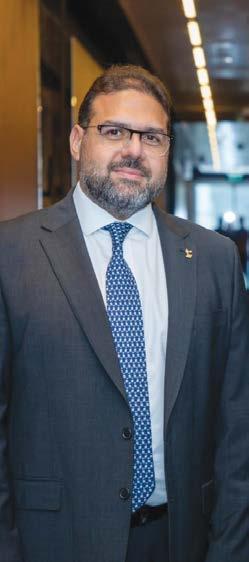
people. But, at the same time, I felt something was always missing, and I didn’t realize how much I missed it actually until I moved
back to Egypt and went back to my startup roots. The missing part was creating and shaping a product holistically. In Google, you shape a product, but it’s a product within the umbrella of Google. But within a startup, the kind of impact you have at the company level feels very different. Also, making a business impact in your home country also feels very personal.”
Elhaddad now steps in as the co-founder and Chief Product Officer (CPO) to propel Efreshli’s product and technology forward. Within her new responsibilities, Elhaddad is especially eager to use her knowledge and experience
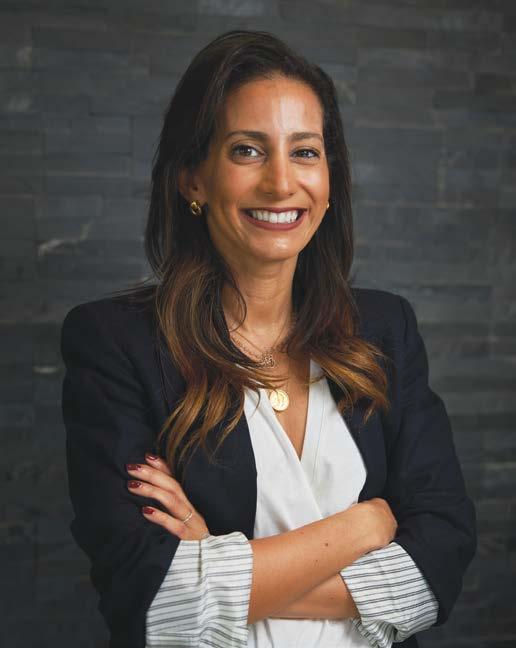
ALONG THE WAY SOME PEOPLE TRIED TO CONVINCE ME TO INCREASE THE FEES, THEY FELT IT WAS WORTH MORE AND PEOPLE WOULD PAY FOR IT. BUT FOR ME ACCESSIBILITY WAS A KEY PART OF OUR MISSION AND THAT’S WHAT WE WERE DOING DIFFERENTLY THAN OTHERS.”
to cultivate local talent in Egypt. “I believe that people are everything, and I learned this both at Google and from my startup experience as well,” she says. “Hiring the right talent and spending enough time on career development and career coaching is as important as doing the job, because that’s the only way you can scale. I think Heba has built a fantastic team.”
Expanding on the lessons that she learnt from Google, Elhaddad adds, “The other thing I learned,
which is critical in a startup, but even at a big place like Google, is being iterative. You can have a great idea, but you might get surprised by how differently it could resonate with your customers. Therefore, being able to strip things down to a minimum viable possible product or idea, and being able to iterate and test it in smaller increments is key. I am also very big on numbers. At Google, I’ve seen the scale of that, and how numbers can inform your decisions
and shape your ideas and plans. That’s why I like to set goals and think about what to expect from certain endeavors. If anyone on my team comes with an idea, I need to have a discussion about the expected outcomes of the new product or feature. But having said that, I’ve also come to realize that numbers alone might not be enough, so balancing that with intuition is key.” Lastly, Elhaddad believes that good teams are built through effective communication. “I learned that
over-communicating and making everything explicit is important in today’s world where we work in hybrid environments,” she says. “It’s very easy for people to drift off, and unless you’re communicating and over-communicating, it’s very easy to go in separate directions. I really like being very clear on communication and overemphasizing things to make sure that everyone’s going in the same direction and to avoid any mishaps.”
The powerful duo have two big goals ahead of them; firstly, they aim for Efreshli to become the leading destination for all things home in the MENA region. “We already have 200 brands and a lot of categories, but we will continue to expand our offering so that we really are able to cater for all your home needs across different price points. Plus, we also have a showroom in Cairo, and we’re now thinking how we can bridge the gap between offline and online and convert our showroom visitors into interior design users,” Elhaddad says. “In addition, we also aim to tap into the overall ecosystem, meaning that we’re trying to become a destination for everyone in that space, not just the consumers.”
Their second goal is to expand Efreshli into the UAE and Saudi Arabia in the near future. ”We were able to create a convenient and accessible interior design offering in Egypt, but it’s needed everywhere,”
Elgabaly explains. “We’ve built something that can work in different markets with certain adaptations. There are pieces that could be centralized and would benefit from economies of scale, such as our technology. Likely, the tech team will remain in Egypt. The product itself, whether the vendor portal or the way we interact with our vendors or the consumer facing side of the business can be easily tailored and stretched to these markets while managing it from Egypt. But there are pieces to it that need to be adapted and localized, such as local partnerships and business development teams on the ground, that have to be adapted for each country.”
Elgabaly and Elhaddad, who are both Harvard MBA graduates, will now combine their complementary skills - Elgabaly’s industry knowledge and connections and Elhaddad’s tech prowess - to make high-quality interior design accessible for consumers across the MENA region. On that path, the entrepreneurial duo is well aware of industry trends. “Personalization is a big one,” Elhaddad says. “Nothing gets more personal than your home. Personalization is generally a trend in all industries, but specifically in this space. It’s almost an expectation of all customers. When you look at global players, you see personalized recommendations and customizations options, and so, everyone is
now trying to cater for that need in a scalable way. Efreshli actually got ahead of that trend because one of our core tenants is to offer a personalized, one-on-one, and accessible solution. We are now focused on using technology to scale personalization in a more meaningful way. Another trend is, of course, artificial intelligence (AI) that is really going to shake up the interior design industry, and we’re looking at the right AI applications for our businesses.”
With its finger on the pulse of interior design trends and the co-founders’ expertise and deep understanding of local market needs, Efreshli is set to shape the future of the industry in the region, and before we part ways, I ask Elgabaly for advice for other founders from her journey of building Efreshli so far. “The vision that you have for your business is not going to go from point A to Z exactly the way you want it,” she says. “You have to know that your vision is Z, but you have to be flexible that it is going to take a few curves to get there. You’re going to set a goal, and somebody is going to do it a little bit differently than you would, and you have to be ok with that. Otherwise, you can try to do it alone, but you’re not going to go very far. So, it’s all about getting the best people that you can find, empowering them, and getting comfortable with things not following that direct straight line that you envisioned.”

“We are committed to supporting startups that are pushing the boundaries of innovation to address significant market gaps. Efreshli is a perfect fit as they are transforming the interior design business model in Egypt and the MENA region by enabling affordable design personalization and diverse product selection through technology. We believe in the incredible potential of Heba and Dina as co-founders, and their dedication to creating a platform that democratizes design for consumers is truly inspiring. By investing in Efreshli, we are not just backing a business; we are championing a movement that empowers individuals to create personalized spaces in their homes. We are excited to be part of this journey and look forward to seeing Efreshli set new standards in the industry.”
“My vision for the brand goes beyond fashion- it’s a philosophy that elevates women’s confidence and self-esteem.”
Having started her career in the technology sector in Silicon Valley, Saadia Khan quickly realized that she can use her knowledge of technology to create a platform that would house global artisanal products. Indus Threads was born as an impact driven brand aiming to empower women all over the world. “In founding Indus Threads, I combined my three passions: travel and discovering new places, love of accessories, and empowering global artisans,” she says. “Indus Threads is more than a fashion brand; it’s a movement that empowers women through style. It has ignited a
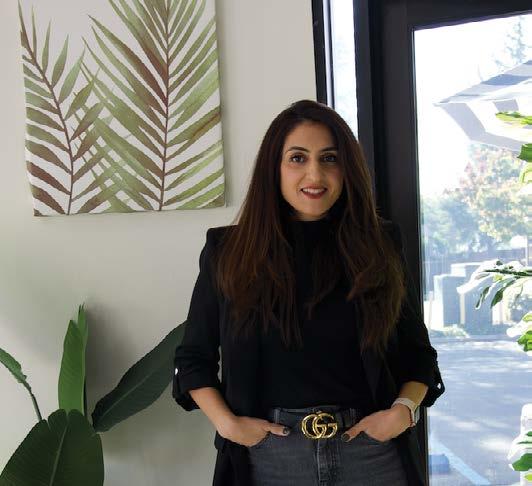
revolution where affordable luxury, trendsetting designs, and impactful philanthropy converge.”
Entrepreneur Middle East talked with Khan about how Indus Threads is shaping a future where personal expression and social impact intertwine, leaving a legacy of positivity and empowerment for generations to come.

ARTISANS.”
You have stated before that Indus Threads is on a mission to empower women. How do you do that?
I believe that accessories have the power to be personal statements of identity and confidence. When a woman selects an accessory, whether it’s a meticulously crafted bag or a dazzling piece of jewelry, she’s communicating an unspoken narrative about herself to the world. It’s an act of unapologetically embracing her individuality and asserting her presence.
Where do you get the inspiration for your collection?
I am forever discovering and exploring new trends, whether online or when traveling. When sourcing, I like to discover local markets and unique products local to that location.
What is your vision for Indus Threads?
My vision for the brand goes beyond fashion- it’s a philosophy that elevates women’s confidence and self-esteem. My belief in the transformative potential of accessories resonates throughout the brand. I am committed to democratizing luxury and that is rooted in my own personal journey. The notion that style should be accessible to everyone guided me to craft a platform where fashion-conscious individuals could adorn themselves with unique pieces that reflect their identity. The idea of affordable luxury is not just a tagline for me, it’s a core principle that fuels my passion to bring top-notch designs to every woman’s wardrobe.
What impact do you wish Indus Threads to have on the world?
Indus Threads goes beyond fashion to
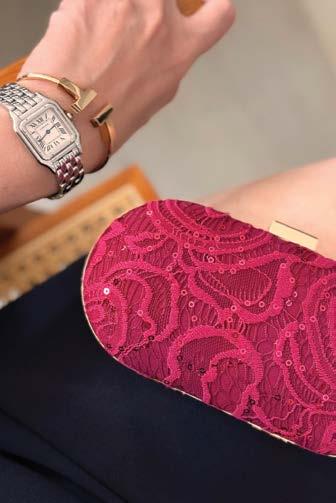

make a real impact in the lives of women. A portion of every sale is directed towards charities dedicated to supporting women’s causes worldwide. My journey began with a visit to a remote village, where I
witnessed women working diligently to support their families through their traditional embroidery skills. This commitment to transparency is evident through the release of our annual impact reports, detailing the allocation of funds and the tangible difference these charities make in communities.
Who has inspired your entrepreneurial journey?
My father, who taught me to dream big, be bold and never play safe.
What is next for Indus Threads?
Scaling and reaching to more women worldwide. Indus Threads continues to evolve, embracing fashion’s ever-changing landscape. Our dedication to providing unique, accessible luxury through impactful accessories remains unwavering. As a trailblazer in the world of fashion, Indus Threads plans to expand its offerings, introducing new collections and collaborations that resonate with its empowering vision. The brand’s commitment to sustainability and empowering women will remain at the forefront of its future endeavors, driving its continued growth and impact.
The stories behind the recent fundraising successes seen by the recent fundraising successes of LEAN TECHNOLOGIES, PEMO, and EPIK FOODS.
by AA LIA M EHREEN AHMED
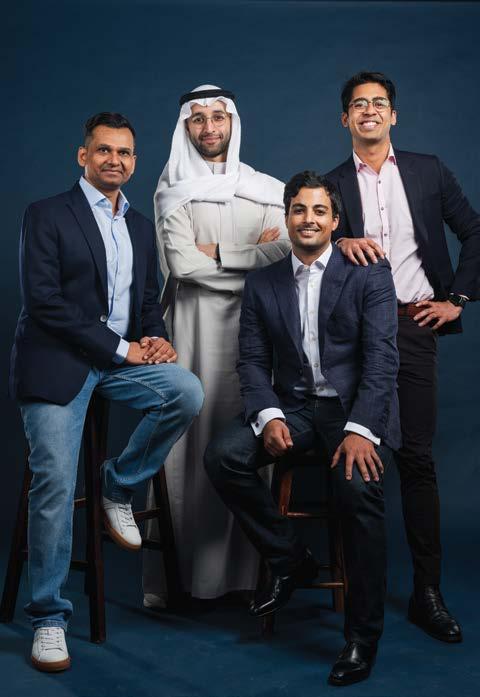
LEAN TECHNOLOGIES (LEAN), A SAUDI ARABIA-BASED FINTECH infrastructure platform
has raised US$67.5 million in a Series B round led by General Catalyst, a Silicon
→LEAN TECHNOLOGIES’ co-founders (left to right): Ashu Gupta, Hisham Al-Falih, Aditya Sarkar, and Mehdi Tazi
Lean Technologies' co-founder and CEO Hisham Al-Falih shares his tips for fintech entrepreneurs in the region
Valley-based global venture capital (VC) firm. The round also saw the participation of Bain Capital Ventures, a US-based global VC company; Duquesne Family Office, a US-based hedge fund managed by renowned American investor Stanley Druckenmiller; and Arbor Ventures, a UK-based global VC firm that invests in fintech startups.
With this round -which marks the first Saudi investments for all the three US-based investors- Lean has so far amassed a total of $100 million in funding.
Launched in 2019 by Hisham Al-Falih, Ashu Gupta, Aditya Sarkar,
} “EMPHASIZE " In this region, every market has its nuances, from regulatory expectations to customer needs. Get a deep understanding of the landscape you're operating in; investors want to see that you're not just solving problems in fintech, but the right problems for this market."
} FOCUS ON BUILDING SOMETHING THAT'S INDISPENSABLE "Don't just create a good product; make sure it's one that businesses can't imagine working without. Solve real challenges in a way that creates lasting value, and you'll attract investors who see that value too."
} KEEP A STRONG NETWORK AND ALIGN WITH KEY PLAYERS "In the region's fintech space, your relationships with banks, regulators, and local stakeholders matter. Build and nurture those partnerships, they'll strengthen your credibility and show investors you have the right foundation to grow."
} BE RESILIENT AND ADAPTABLE
"The fintech landscape is dynamic, and what worked yesterday might not work tomorrow. Stay close to your customers, stay agile, and be ready to evolve with the market. Investors back teams that show they can weather change and still deliver."
and Mehdi Tazi, Lean essentially operates as an open banking platform for banks and other financial and fintech entities in the MENA region, with a strong focus on Saudi Arabia and the UAE. “Back in 2019, we noticed that the fintech landscape in the Middle East was still in its nascent stages, and this posed a significant challenge for financial innovation in the region,” recalls Al-Falih, who is also the CEO. “We saw this not just as a problem but as an opportunity to make a meaningful impact. Our vision was to build a company that could serve as a catalyst for financial innovation, helping it flourish so that consumers and small and medium enterprises (SMEs) could gain better access to the tools and services they needed. We believed that by doing so, we could empower individuals and businesses to build more resilient and successful financial lives.”
To turn this vision into reality -and thus make financial data and payments more accessible, transparent, and beneficial for consumers and businesses alike- the startup offers a universal application programming interface (API) that enables businesses to gain safe and secure access to their customers’ bank account details, live balances and transaction history. What this essentially enables is a gateway for businesses to receive vital customer data in a standardized format, regardless of the bank the end-customer uses- a move that, as the Lean team puts it, helps “create a more inclusive and connected financial ecosystem.” “With the completion of our Series B funding, we’re now better equipped to accelerate this mission!” declares Al-Falih. “The new capital enables us to invest more heavily
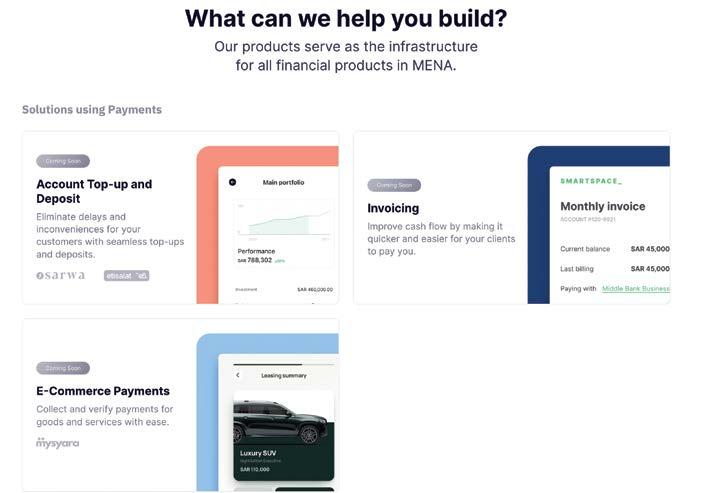
in developing our technology platform, expanding our product offerings, and entering new markets. Specifically, we’ll be enhancing our APIs to support a broader range of financial services and forging stronger partnerships with financial institutions. This funding brings us one step closer to realizing our goal of democratizing access to financial services and fostering a more inclusive and dynamic financial ecosystem across the Middle East.”
Indeed, the startup already has two new features that are expected to go live soon. The first is an integrated payments tool that enables seamless customer-to-business (C2B) and customer-to-customer (C2C) payments from connected retail bank accounts. The second anticipated feature is a payment operations option that offers customers with almost real-time payouts, as well as a simple dashboard for customers to reconcile payments coming in via Lean to their bank accounts. And according to Al-Falih, the fresh funds will be allocated primarily towards finetuning its products, and thereby further cementing its position in markets it currently operates in- i.e. Saudi Arabia and the UAE. “Instead of focusing on market expansion at this stage, we’re dedicating resources to deepen our impact
within these key regions,” he adds. “We’re investing in the development of cutting-edge products designed to unlock critical use cases for some of the largest businesses across a variety of industries. This means enhancing our existing infrastructure and expanding into new types that align closely with the evolving needs of our clients.”
Now, notably, Lean’s services have already been utilized by quite a few name brands in the region. In the UAE, regulated by the Abu Dhabi Global Markets, the startup has seen its account-to-account (A2A) payment solution -a tool that simplifies pay-ins and payouts by transferring funds directly between two bank accounts- for clients like e&, DAMAC, and Careem, with over $2 billion in total processed volumes. In Saudi Arabia, a launch of its data solutions under the Saudi Central Bank’s regulatory sandbox helped verify nearly one million bank accounts. The startup’s offerings have also been used to create new use cases by the likes of Tabby, Tamara, and Salla.
Here, however, Al-Falih quickly raises a topic that sometimes goes unaddressed: the role of human talent in building core technology.
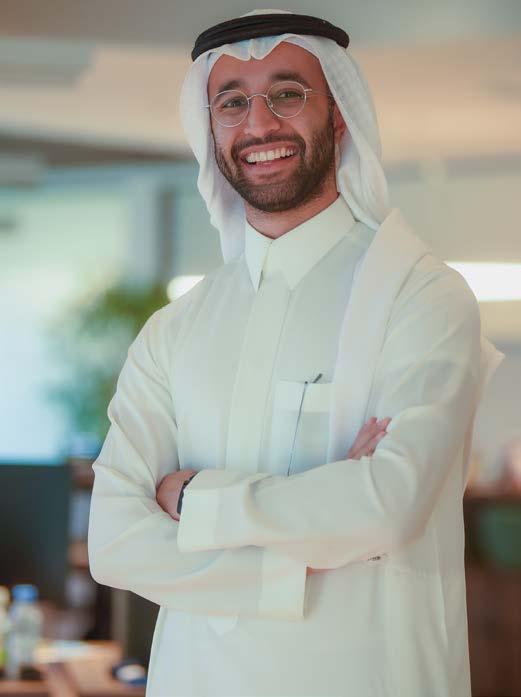
→ HISHAM AL-FALIH is the co-founder and CEO of Lean Technologies
compound annual growth rate, the $1.51 billion MENA fintech market is expected to reach $2.4 billion by 2029, as per a report by Mordor Intelligence. The same study also shows that by 2025, the number of fintech startups in the region will surpass 250. With the UAE and Saudi Arabia at the forefront of this fintech revolution, Al-Falih notes that Lean’s main differentiating factor has been a culmination of the team itself, a focus on the clients it serves, as well as a deep understanding of the region it operates in. Our approach is driven by an obsession with our customers.
THIS HAS BEEN A CORE FOCUS FOR LEAN SINCE DAY ONE- WE BELIEVE THAT ACCESS TO SECURE, EFFICIENT FINANCIAL SERVICES SHOULD BE UNIVERSAL, BENEFITING BUSINESSES AND CONSUMERS ALIKE.”
“While a significant portion of the investment will go toward enriching our technology stack and fortifying partnerships with banks and financial institutions, we also recognize that achieving these objectives hinges on the strength of our team,” Al-Falih says. “So we’re also investing heavily in human capital. By bringing on board talented individuals who share our vision, we’re
ensuring that we continue to innovate and provide exceptional value to our clients. This strategic allocation of funds positions us to better serve our current markets and paves the way for future growth.”
Al-Falih’s eager acknowledgment of his team is, in some ways, a segue to the booming and saturated regional fintech industry. Expected to grow at a mighty 9.71%
“Our approach is driven by an obsession with our customers,” he says. “We’re guided by what our clients and the market need, so everything we build has a purpose and impact that goes beyond functionality—it’s about creating solutions that make a difference. We also know our market. Our understanding of MENA’s unique financial landscape, regulatory frameworks, and cultural
dynamics enables us to create solutions tailored to this market and its evolving ecosystem. Finally, our team is made up of experts who have previously worked at some of the world’s leading fintech companies, like Plaid, GoCardless, and TrueLayer. This experience allows us to build products that aren’t just secure and efficient— they’re truly best-in-class.”
As Al-Falih and his team now gear up for a promising 2025, the CEO and co-founder reiterates that enabling financial inclusion will continue to be a major driving force for Lean. “This has been a core focus for Lean since day one- we believe that access to secure, efficient financial services should be universal, benefiting businesses and consumers alike,” he says. “In the Middle East’s fast-growing fintech landscape, there’s a unique opportunity to bridge accessibility gaps and create tools that empower SMEs, enterprises, and individuals to participate fully in the financial ecosystem. By expanding access to financial data and offering seamless payment solutions, we’re fostering a more inclusive financial landscape across the region. This ripple effect goes beyond individual businesses; it drives regional economic growth, encourages innovation, and supports a connected ecosystem where financial services are accessible and impactful for all parties involved.”
pemo.io
PEMO, A UAE-HEADQUARTERED SPEND MANAGEMENT PLATFORM that caters specifically to small and medium enterprises (SMEs) across the MENAP region, has raised US$7 million in a Pre-Series A funding round led by Augmentum Fintech, a UK-based fintech-focused venture capital (VC) firm, and Shorooq, a UAE-based multi-dimensional investment firm.
Launched in May 2022 by Ayham Gorani, Alessandro Duri, Saed Ghorani, and Valerie Konde, Pemo has been designed as a one-stop-solution for businesses to efficiently automate expense management operations. To do this, it offers a suite of services including pre-paid corporate cards, invoice payment systems and corporate expense tracking software. “SMEs are all too often worn down by cumbersome, manual processes such as expense management,” notes Gorani, who is also the CEO. “There are so many inefficiencies when it comes to expenses: lost receipts, incorrectly logged documents, and lengthy approval processes that can cause major headaches to finance teams who are often already stretched
AS A HOMEGROWN UAE STARTUP, WE HAVE RAPIDLY ESTABLISHED PEMO AS A TRANSFORMATIVE FORCE IN THE FINTECH LANDSCAPE, DELIVERING AN ALL-IN-ONE SPEND MANAGEMENT SOLUTION TAILORED TO THE UNIQUE NEEDS OF BUSINESSES IN THE MIDDLE EAST AND BEYOND.”
as it is. We provide a great solution with Pemo, as we automate the whole spend management process, right from payment, to expense submission and approval, to account reconciliation. We provide corporate cards that take the hassle away from the process. In doing so, we can provide full visibility and control of employees expenses (including setting limits on spending), meaning that the business has more time to focus on growing the company and less time to spend on inefficient processes that become real ‘time drains.’”-

Now, this latest funding announcement follows Pemo’s completion of AED1.4 billion in annualized transactions. In the same year it was launched, the startup also raised $12 million in a seed round led by Cherry Ventures, a Germany-headquartered VC firm, and the aforementioned Shorooq. Pemo has also clinched an impressive customer base of over 4,000 companies in the UAE alone, including the likes of Movenpick, Conde Nast, Anantara Hotels and Resorts, and L’eto. As such, the Pemo team has felt largely validated and encouraged by these milestones. “Pemo’s growth story has been nothing short of remarkable, and in its relatively short lifespan, and I’ve been proud to help drive its expansion over the last two and a half years,” Gorani adds. “As a homegrown UAE startup, we have rapidly established Pemo as a transformative force in the fintech landscape, delivering an all-in-one spend management solution tailored to the unique needs of businesses in the Middle East and beyond. The SME ecosystem in the UAE is thriving, with almost 94% of businesses in the country being SMEs, providing a strong market for Pemo to tap into– and we’re now looking forward to strengthening our presence in markets beyond the UAE. We’ve been lucky to have had many milestones since we launched the business, and all of them have been a testeament to the hard work of our team, which operates with a ‘customer first’ mentality. Bringing all of this together was the award we received from Entrepreneur Middle East in September this year, as we were named Best Expense Management Solution of the Year– a marker of the work and dedication of our team.”
Indeed, one of the main areas of allocation for Pemo’s new funds is geographical expansion. And according to Gorani, moving forward, the startup’s ability to fully incorporate the clients needs will remain its most formidable asset owing to the fact that Pemo’s founding team -a mix of serial entrepreneurs, Rocket Internet and Google alumni- has collectively launched/scaled more than eight ventures. “We know only too well how inefficient processes
can slow the whole business operation down,” he adds. “We also know the importance of having a solid customer-centric approach to the way we work, and this is the real benefit of using Pemo. We put the customer at the heart of what we do. And with the 4,000 customers we now have on board, we have always been careful to never compromise on our service levels. Testament to this is our G2 rating [customer satisfaction scores and reviews published on G2, an online software marketplace and review platform] of 4.8, which shows our dedication to delivering great customer service and products.”
Such confidence shown by the end-users, and the achievements Pemo has already clinched along the way, have certainly played a role in gaining the trust of its lead investors. “We believe Pemo is well-positioned to play a pivotal role in driving economic growth across the Middle East, a region we are closely monitoring and where we see considerable opportunity and exciting developments in the fintech space,” said Augmentum Fintech CEO Tim Levene in a statement.”With our extensive expertise and network in the fintech sector, we are excited to support Pemo as they embark on this next phase, unlocking the market’s vast potential through transforming expense management and corporate payments, and accelerating the growth of SMEs on a global scale.”
Sharing similar sentiments was Dr. Bilal Baloch, Partner at Shorooq, added: “Pemo has been on an exciting journey from day one. We recognised the potential of the business early on, building a value creation plan for the company, and it’s been great to see them go from strength to strength under the leadership of stellar co-founders.”
For Pemo, the support of Augmentum Fintech and Shorooq has only reinforced its business mission.
“Having the endorsement of such experienced investors has really been a game-changer for us, and we’re very much looking forward to using the funding to help accelerate our growth,” Gorani says. “It’s both a reflection of the business potential investors are seeing in Pemo, and the opportunities for this sector when it comes to expansion and building on our offering. Our intention is to use the funding to further invest and enhance our product, build our team so that we’re continuing to attract the brightest talent and use the skills and knowledge of the investors to help us break into new markets.”
While Gorani and his fellow co-founders remain proud and certain of what Pemo has to offer as a standalone entity, they also note that some credit of their startup’s quick growth goes towards successful partnerships. “Last year, during the annual Dubai-based tech and startup event GITEX Global, we were proud to announce our strategic partnership with Mastercard,” Gorani shares. “This has enabled us to be able to offer enhanced benefits to customers such as better transaction security and wider acceptance of our smart corporate cards. This has also helped to further solidify our position as a market leader in the fintech space. We’ve been proud to be able to offer even more benefits to our customers via our corporate and virtual cards as a result of this, including cashback rewards, Careem discounts, software discounts (for example, on Google Ads) and travel discounts (with discounts off booking websites and access to travel lounges).”
As the Pemo team now rolls up their sleeves for 2025, it isn’t lost on them that being based in a fintechfriendly nation will continue to be a safety net as it looks to scale and expand. “I think being based in the UAE, we have started our business
in an ecosystem which is very ‘pro startups’ and ‘pro the entrepreneurial mindset,’” Gorani says. “This has created an environment which has really fostered and nurtured our growth, and working with the very brightest fintech talent in the sector, we have been able to scale from a team of three to over 60 people, from 15 countries so far. Whilst we have a base and an office in Dubai, our talent is based around the world, showing that a fintech company can be truly borderless when it comes to the location of its best talent.”
Ayham Gorani, co-founder and CEO of Pemo, shares his tips for entrepreneurs
} SECURING YOUR CUSTOMER BASE IN THE EARLY DAYS IS PARAMOUNT "Despite many businesses having a great product, it's often surprising how little SME owners know about their real customer and what they want. So, understanding your customer and how big the problem is you're solving for them is key from the start."
} HAVING THE RIGHT PEOPLE ON BOARD IS IMPORTANT "Once you've got your initial wave of customers secured, investors and partners can help unlock access to more of the right type of demographic. When connecting with investors, it's important that you work with those who understand your market, those that can open doors, and those that can help you solve your challenges, connecting you to the right ecosystem."
} SURROUND YOURSELF WITH THE RIGHT TEAM "Especially when considering investors and accelerating your customer acquisition growth, get people with expertise in the right fields. For example, when working in tech, you may want to include team members who have expertise in software as a service (SaaS) product building, or taking business to business (B2B) SaaS products to market, or scaling business operations.
↓
KHALED FADLY
and
RANYA BASYUNI, co-founders of Epik Foods
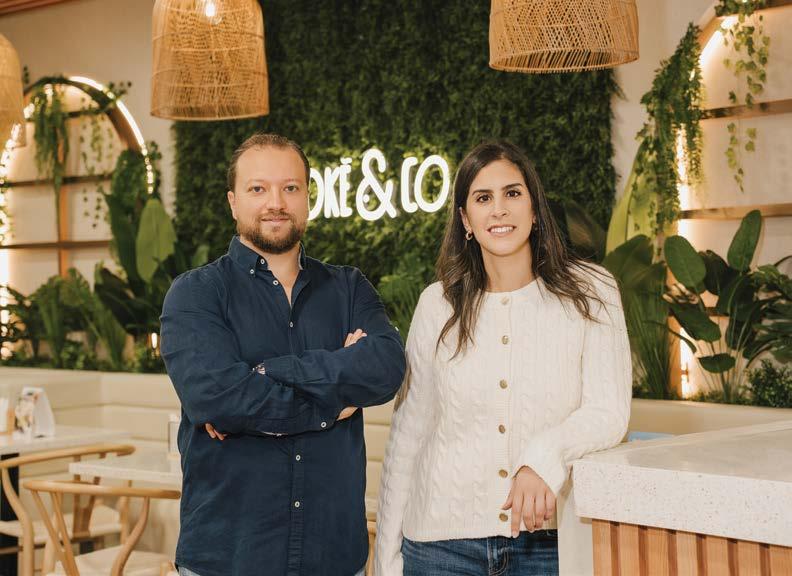
EPIK FOODS’ “SECRET SAUCE” LIES IN A BALANCE OF UNDERSTANDING, INNOVATION, AND CONSISTENCY. WE ACTIVELY LISTEN TO CUSTOMERS AND USE DATA-DRIVEN INSIGHTS TO ANTICIPATE THEIR NEEDS, ENSURING OUR OFFERINGS RESONATE.”
EPIK FOODS, AN F&B GROUP which operates over 60 brands across the UAE, Saudi Arabia, and Oman, has secured US$15.5 million in private capital funding from Ruya Private Capital I LP, a fund managed by Abu-Dhabi based independent private credit firm Ruya Partners. Officially launched in December 2023 through the consolidation of three distinct F&B entities
-KR&CO, Sweetheart Kitchen, and Happy Platter Kitchens- Epik Foods was created in partnership with Gulf Islamic Investments Group, a UAE-based full-service Shariah compliant financial services company. Today, among the many concepts that fall under Epik Foods, across 50 locations, are Acai & Co, Poke & Co, Healthy & Co, Eats & Co,
Training Day, Bagel & Co, Calculeat, Affordabowls, Chick’n Co, and Protein Powerhouse.
The group’s latest investment news thus comes just days away from its first anniversary as a fully operational business. “2024 has been a year of both milestones and challenges for Epik Foods,” says Khaled Fadly, co-founder and CEO of Epik Foods, in an exclusive
interview with Entrepreneur Middle East.
“Navigating fluctuating consumer spending in a competitive F&B market, managing rising costs, and overcoming supply chain disruptions have tested our agility. Maintaining quality and consistency across our diverse offerings while scaling has required innovation and resilience.
Despite these challenges, we’ve made strides in achieving our vision of a multi-brand ecosystem that seamlessly integrates dine-in restaurants, catering, and meal plans. With a strong foundation in place, we remain committed to expansion and innovation to elevate our offerings and strengthen our market presence.”
With this new capital, Epik Foods is thus set to catalyze its growth plans, including the aiding of some of its key acquisitions, supporting the company’s diverse portfolio and concepts, and most importantly, furthering its expansion plans into Saudi Arabia as well as the opening of 20 new locations which are already in the pipeline.
“The new funds will be strategically allocated to fuel Epik Foods’ growth and strengthen our mission of delivering diverse, high-quality dining experiences,” says Ranya Basyuni, co-founder and Chief Creative Officer of Epik Foods. “We’re expanding into new cities across Saudi Arabia and the UAE, while exploring opportunities to grow our catering and meal plan
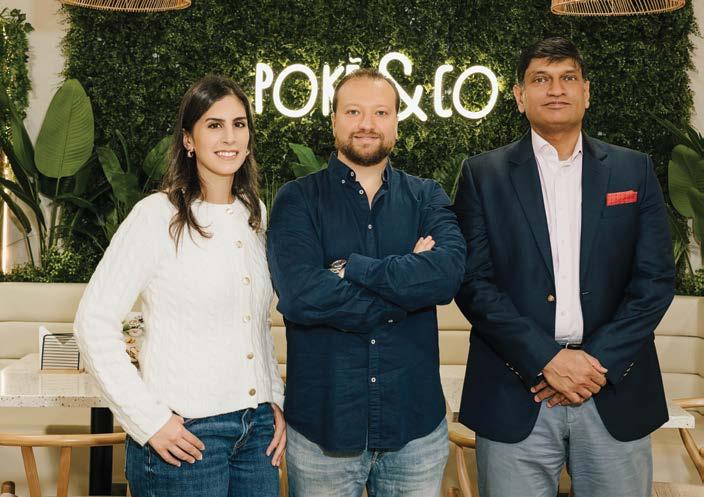
WE’RE EXPANDING INTO NEW CITIES ACROSS SAUDI ARABIA AND THE UAE, WHILE EXPLORING OPPORTUNITIES TO GROW OUR CATERING AND MEAL PLAN DIVISIONS TO MEET RISING DEMAND.”
divisions to meet rising demand. Investments in Epik Tech will enhance operational efficiency, customer engagement, and convenience. Additionally, we’re launching new brands and dining locations to diversify our offerings and capture evolving consumer trends. These initiatives reflect our commitment to innovation, quality, and creating exceptional culinary experiences across the region.”
A key factor that has defined Epik Foods journey so far has been its ability to maintain a loyal customer base while consistently introducing new and innovative concepts. And according to the founding duo, the group’s secret sauce in maintaining both aspects has been a keen dedication to the diverse palettes of the region’s customers. “Epik Foods’ “secret sauce” lies in a balance of understanding, innovation, and
consistency,” Fadly adds. “We actively listen to customers and use datadriven insights to anticipate their needs, ensuring our offerings resonate. Innovation keeps our brand dynamic—whether it’s introducing trend-forward dishes, embracing health-conscious eating, or enhancing convenience through seamless online and offline experi ences. At the same time, we uphold unwavering consistency in quality, reliability, and service. This approach allows us to experiment with new concepts while maintaining the trust and loyalty of our customers, ensuring they feel valued and engaged at every step.”
As such, it is primarily this mindset that is set to drive forward its operations in the upcoming new year and beyond. “As we move into 2025, several trends within the regional F&B market are particularly





